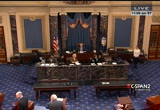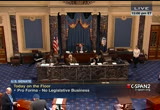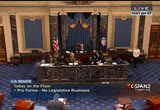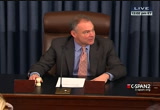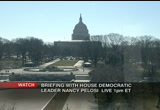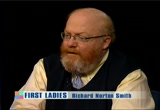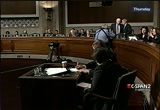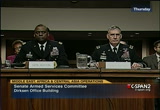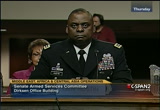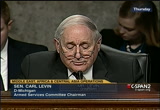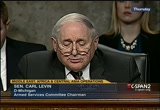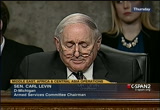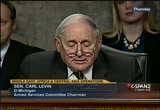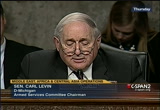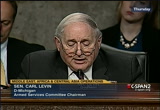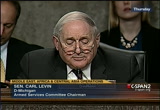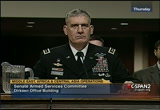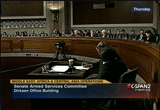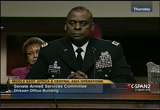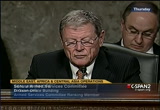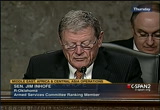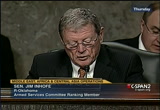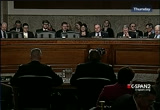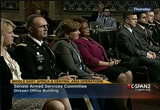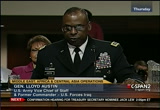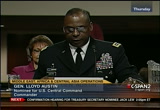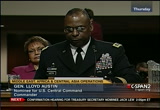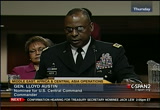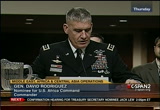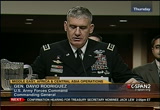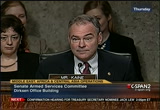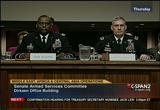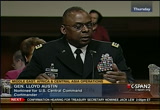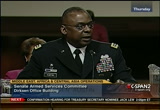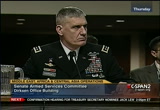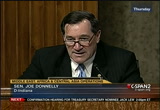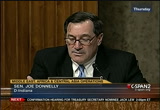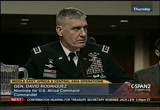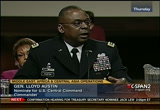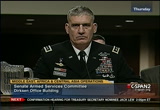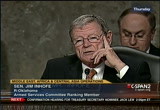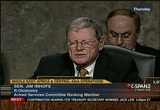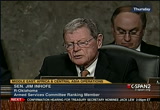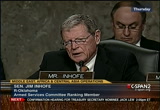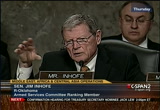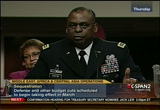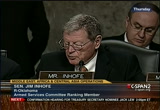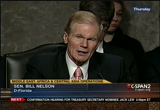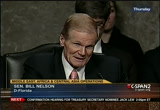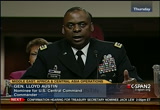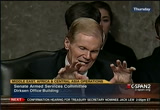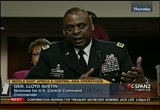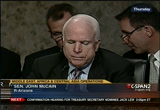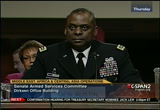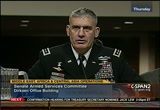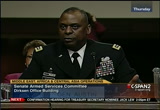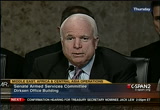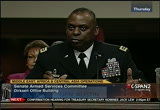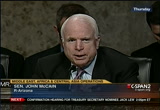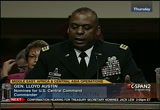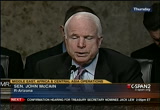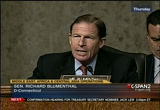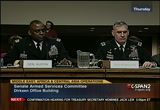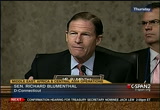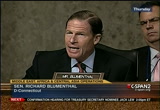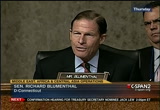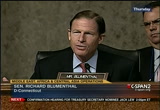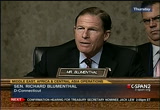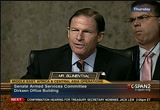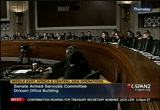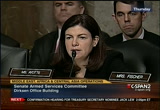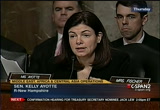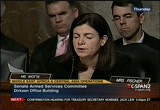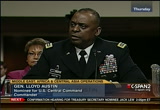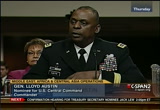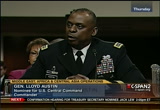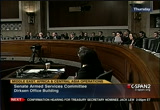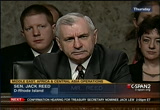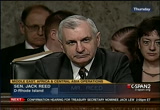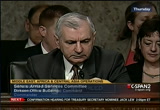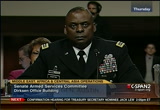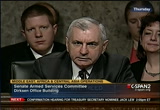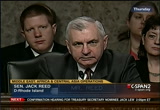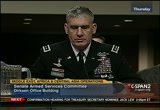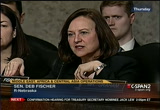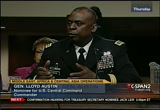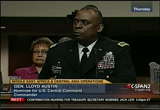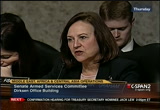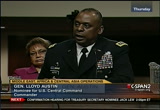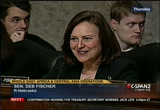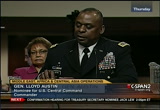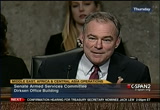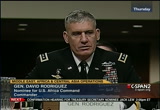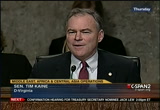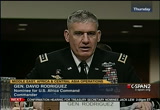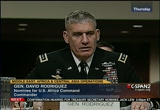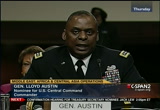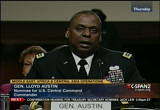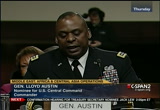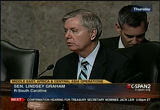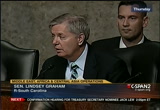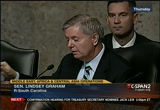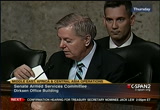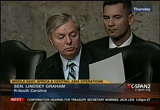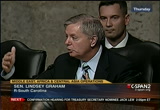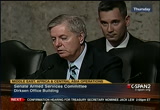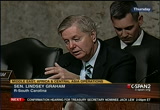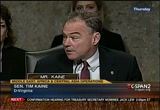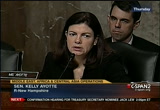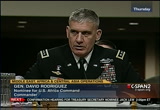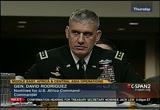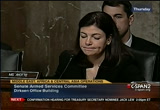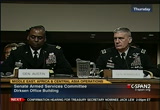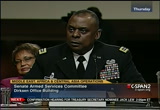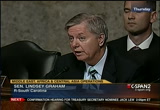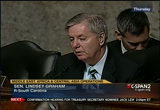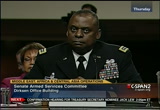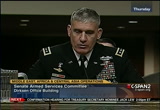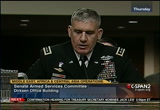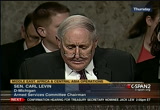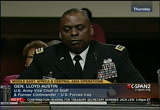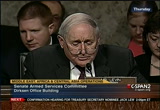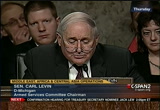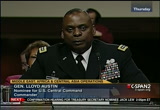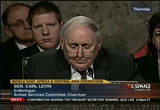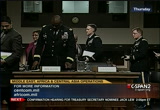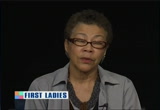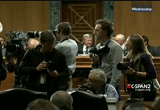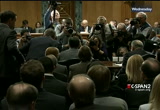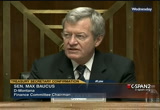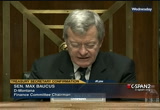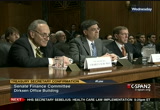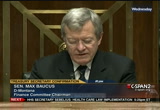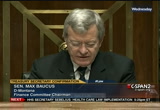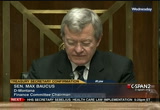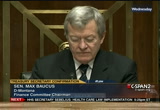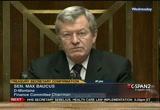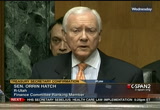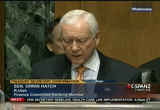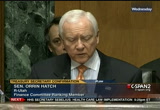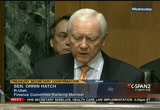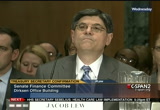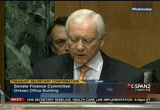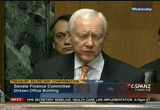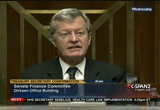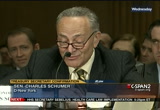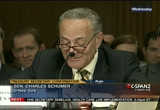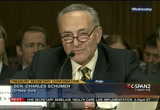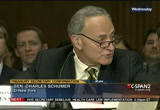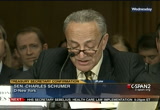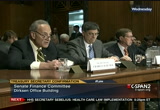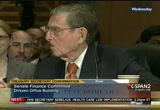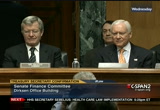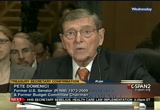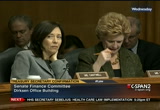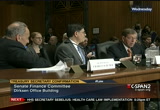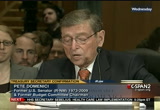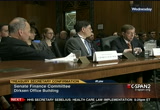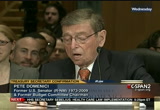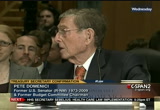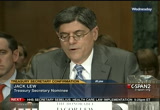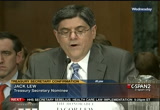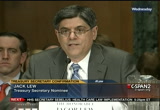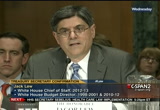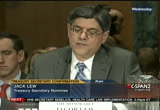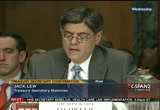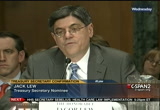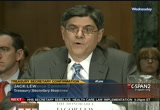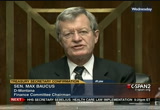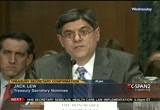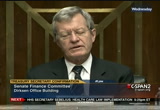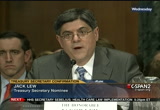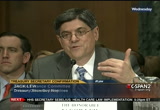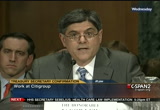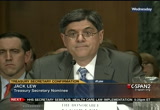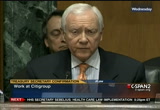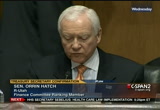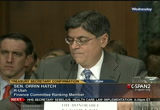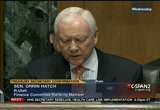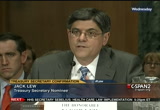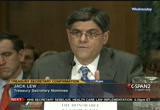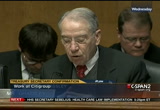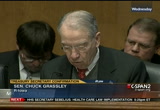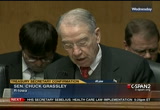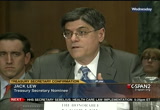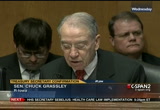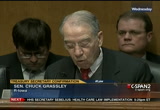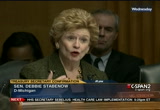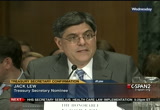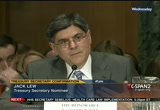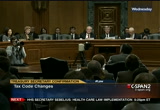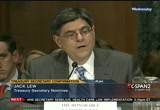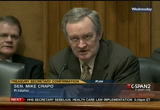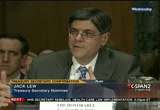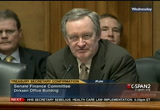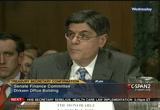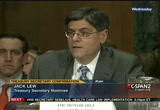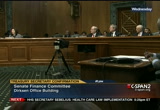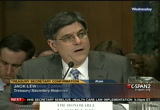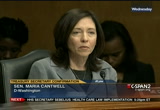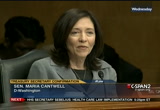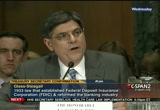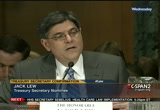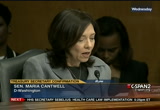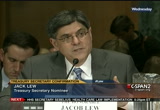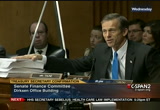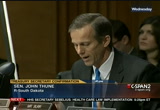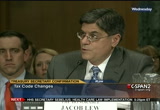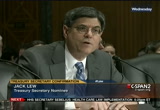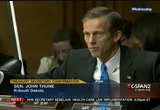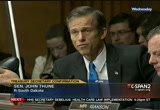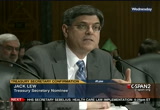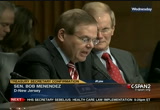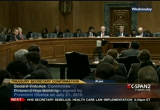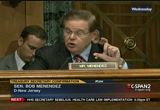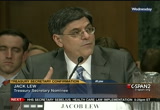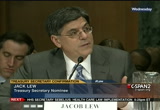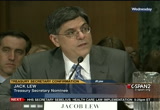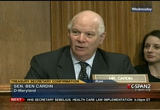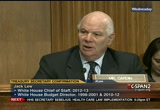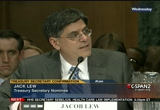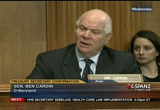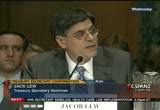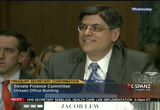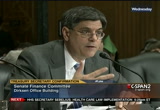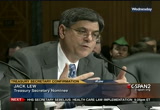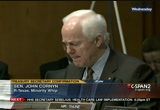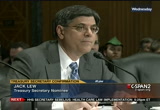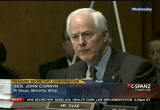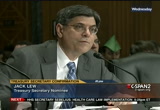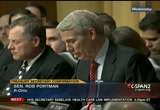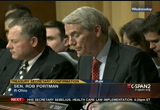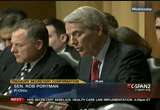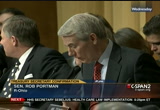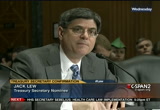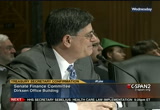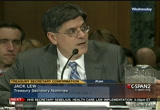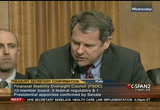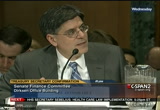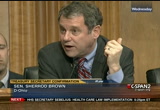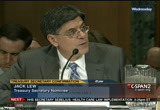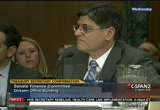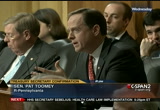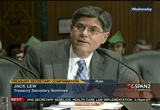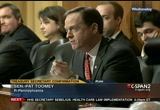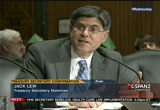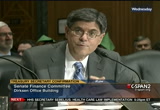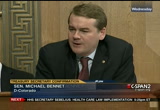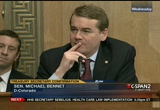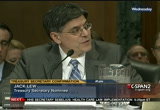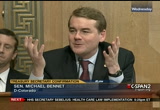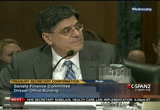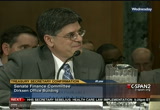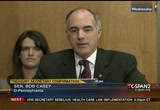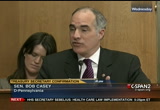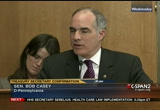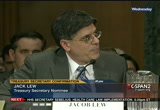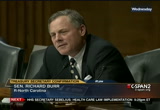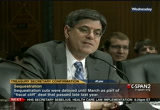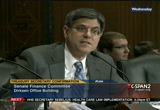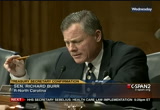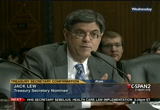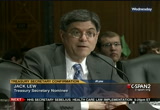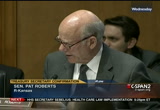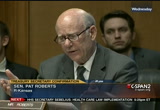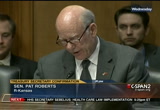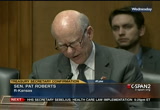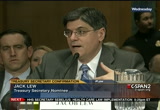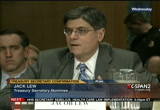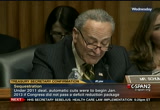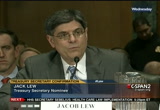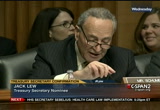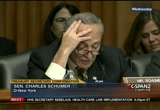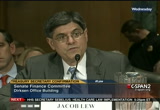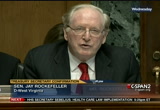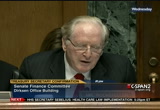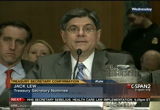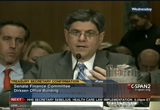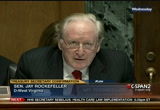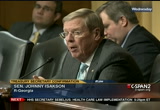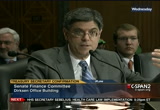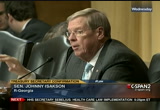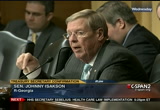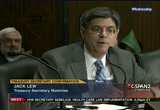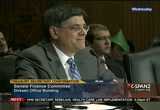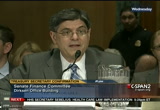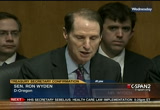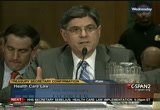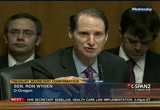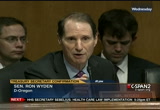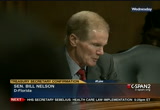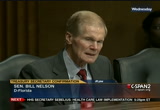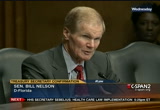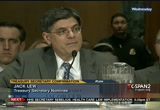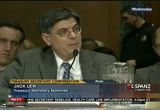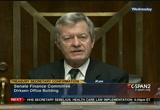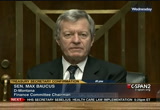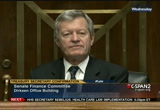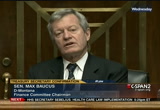tv U.S. Senate CSPAN February 15, 2013 12:00pm-5:00pm EST
12:01 pm
the presiding officer: the senate will come to order. the clerk will read to the senate. the clerk: washington, d.c., february 15, 2013. to the senate: under the provisions of rule 1 paragraph 3 of the standing rules of the senate i hereby appoint the honorable tim kaine, a senator from the commonwealth of virginia, to perform the duties of the chair. signed patrick j. leahy, president pro tempore. mr. levin: mr. president? the presiding officer: the senator from michigan. mr. levin: mr. president, i ask unanimous consent that it be in order to consider h. con.
12:02 pm
res. 15 which was received earlier today. the presiding officer: without objection, so ordered. mr. levin: mr. president, i ask unanimous consent that h. con. res. be agreed to. the presiding officer: without objection, so ordered. mr. levin: i ask unanimous consent, mr. president, that not withstanding the resolution of the senate of january 24 ... january 24, 1901, the traditional reading of washington's farewell address take place on monday, february 25, following the prayer and pledge. further that senator ayotte be recognized to deliver the address and that following the conclusion of the reading the senate proceed to morning business under the previous order. the presiding officer: without objection, so ordered. under the previous order, the senate will now stand adjourned until 2:00 p.m., monday, february 25, 2013 pursuant to the provisions of h. con. res. 15.
12:03 pm
continue their week-long holiday break for presidency. the senate will return the week of february 25th to be the defense secretary. we will also be debating on a judicial nomination. you can see live coverage of the senate when they return on c-span2. the house is in today. a short time ago members passed a bill freezing the pay of the federal workers through the end of the year. president obama asked for a half percent pay increase for workers expected to increase next month. the vote was 261 to 154 nays. they also condemned north korea for the reason to appear activities in violation of u.n. resolution to the you can see live coverage of the house on c-span. also want to quickly tell you the house democratic leader nancy pelosi will be having a
12:04 pm
briefing. live coverage beginning at 1 p.m. eastern on. coming up on c-span3 this afternoon live remotes from the motion picture christopher dodd. former connecticut speaker >> i think the women themselves were interested in politics that have no vehicle to express that in their own lives so they were attracted to men who were going to become politically active or were already politically active. >> i find it intriguing over half of them are precisely because they are so obscure historical a. i think half of these women probably would be almost totally unrecognizable to most. >> this president's day for the
12:06 pm
the senate armed services committee you heard yesterday from the former commander of u.s. forces in iraq general loy austin to lead the command which is responsible for operations of middle east and afghanistan. general austin was joined by u.s. command nominee general david rodriguez who is a top commander in afghanistan from 2007 to 2011. this hearing is chaired by carl levin of michigan. it is two hours.
12:07 pm
>> good morning everybody and welcome this morning that committee considers the nomination of two very distinguished officers to the two of the most active and challenging combatant commands. general lloyd austin united states army nominated to the commander u.s. central command, and general david rodriquez, u.s. army to be nominated to be commander of the u.s. africa command. fees' to combat and commands, centcom and africom are the centers of gravity for the military's operations to counter the threat of terrorism. both nominees have served the country with distinction, and i want to faint each of you for your decades of military service and a willingness to serve once again.
12:08 pm
i and stand general austin's life and rodriguez's life are with us this morning. i want to acknowledge them and thank them for their sacrifice and support to the nominee's throughout the years which is so essentials to the success of the nominees and as is the tradition the nominees are invited to introduce any family members or friends who may be with them this morning with their opening remarks. if confirmed, general austin will consume command of centcom during the transition period for the military operations in afghanistan. in the coming months afghan forces will assume the lead, the lead responsibility for providing security throughout their country, with coalition forces stepping back to a support role. and on tuesday, president obama announced during the state of the union address plans for
12:09 pm
drawing down half of the 66,000 u.s. troops in afghanistan this year, a 34,000 troup production by february of 2014. the president continues to consider options for a significantly reduced u.s. military presence in afghanistan after the end of 2014 which will depend on many things but in part on negotiations with the government of afghanistan over a legal protection for the troops. the president has made clear that the missions of any residual u.s. military presence in afghanistan after 2014 will be limited to counterterrorism operations and tracing to the training and advising forces. general austin would bring exceptional experience overseeing this transition having commanded u.s. forces in iraq during the reduction of u.s. forces and equipment from
12:10 pm
iraq. just this past weekend, the forces in afghanistan have had a change of command with, excuse me, joseph replacing general john allen as the commander of the international security assistant forces and commander u.s. forces afghanistan. i want to take this opportunity to see three general ellen for your thoughtful and devoted leadership and afghanistan for his forthrightness and interactions and the rest of the members of the committee. when senator reid and i visited afghanistan and january we saw the signs of progress including the afghan security forces increasingly taking the lead responsibility for protecting their country. good stories about afghanistan and the afghan security forces don't seem to get the coverage in the u.s. media that is given to the negative stories. for example, it was widely reported -- was widely reported
12:11 pm
that only one of 23 afghan brigades is rated by isaf as independent what we heard from afghanistan 87% of operations, and afghanistan's regional critical command are carried out by the afghan security forces. another success story is now the 18,000 strong afghan local police program. these community defense forces were coordinated with the district level afghan national police and army forces are more and more effective at in the helvering afghan communities to defend against taliban intimidation and violence. plans are being developed to increase the authorized size of the program from 30,000 down to 45,000. the next commander will also play an important role in shaping our partnership with
12:12 pm
afghanistan after 2014. a partnership that i fully support. i am concerned however by plans to reduce the afghan national security forces by a third starting in 2015. of retreated 52,000 to two injured 30,000 by 2017. i believe any future reductions in the size of the afghan forces should be based on security conditions in afghanistan at that time and as afghan security forces' progress in providing for their country's security, we should reassure them that we will continue to support these efforts by citing as we withdraw our forces that there won't be a drawdown in afghanistan forces. progress in afghanistan remains fragile, significant challenges to afghanistan's long-term stability remains.
12:13 pm
among the greatest threat to the stability is the safe havens for the afghan insurgents across the pakistan border which the government of pakistan has failed to disrupt or eliminate can get in addition, the major shortcomings of the government of afghanistan in delivering governance and fighting corruption creates political and economic instability that could exacerbate the challenges to the 2014 transition. in addition to afghanistan, centcom must continue with one of the most significant issues in the current national security debate. the threat posed by iran and its pursuit of its nuclear program. as the commander general austin will be at the tip of this year with regards to preparing militarily for the potential armed conflict with iran. i assure the president's view must remain on the table with respect to iran. iran's hand can be seen through
12:14 pm
the region including its relentless pursuit of instability and for minting of violence through proxy's such as hamas and hezbollah and through its own covert activities in the region. already destabilizing events and syria, yemen, egypt, iraq and sudan are made worse by iran's funding and supplying of terrorist organizations seeking to undermine the government's and to spark further conflict among sectarian and tribal groups. centcom has a critical role to play in leading efforts across the region to counter iran's influence. the defense in syria and continue to deteriorate. the impact on the regime's increasing dependence on support from iran and distractions to hold on to power can be seen in the thousands of refugees that flow into the towns and villages of serious's neighbors. while the united states is focused on providing humanitarian relief and we felt
12:15 pm
assistance to the syrian opposition, the centcom commander will be asked to advise on the situation in syria including whether to provide legal assistance to the opposition, with the united states should conduct limited strikes against the military capabilities and whether the united states should seek to build a coalition of nations to take more significant military action. these are extraordinarily complex issues the general will be asked to share his views on today. centcom's area of responsibility remains the central location of many of them on state terrorist threats the nation faces. in addition to courts al qaeda in pakistan and the re-emergence in iraq, al qaeda and the arabian peninsula remains focused on attacking the united states and our interests. the centcom forces continue to assist our security partners in preventing al qaeda from taking
12:16 pm
advantage of areas in yemen where the government has limited control. if the events in benghazi for a powerful reminder of the need in public expectations for the capability to respond quickly to the crises around the world. this is one of the major situations general rodriguez is going to have to address and will consume a great deal of his time that's far from what it to benghazi and lydia. we have struggled in africa to find footholds to allow for the responses to the type of events that occurred in benghazi and allow us to conduct day-to-day operations like intelligence collection. africom has received less than the way of resources and support and other geographic commands and this disparity may grow in
12:17 pm
the resource constrained environment. these challenges combined with a destabilizing impact such terrorist and criminal networks on a general rodriquez's tosk at africom among the most complicated in the department. an additional matter in the africom aor the committee watches closely as the ongoing support of u.s. operations in central africa to assist the multinational effort to remove joseph coney and top lieutenants in the battlefield. this committee and general inhofe has been very active in this effort and has sought to ensure the mission is adequate resource including additional intelligence surveillance and reconnaissance capabilities. general rodriquez, i know that you are familiar with this mission and the committee looks forward to hearing from you about it and working with you on that and so many of the other challenges that you will be facing. i am going to turn the gavel
12:18 pm
over to senator kain has agreed to take over because i must close to the floor and i will call on senator inhofe. >> thank you mr. chair and i join you in welcoming the witnesses. i've had an opportunity to get to know them in the past and i'm very anxious to move on with this and i think charlene and jenny for being here. we appreciate your sacrifices. when confirm or if confirmed, general austin you'll be in charge of overseeing arguably the most volatile region of the world in the midst of the declining defense budget and just last week secretary panetta announced the indefinite delay of carrier stryker the deployment in the middle east development of was undoubtedly welcome by the regime in tehran. in egypt despite the best hopes,
12:19 pm
the president morsi and the brotherhood have shown a trip and hostility towards the opposition groups and the minorities have taken an increasing tone to our ally israel and these developments require as to think long and hard over what assets we are going to be sharing with them, the controversy will f-16 transfers. but it's a tough area and i think if you look through that area, and general austin you know that iran maintains determined to acquire nuclear weapons capability that's been going on for a long time we found that our intelligence has really behind the curve so far. it's serious. it's big stuff over there. in iraq for premature withdrawal tester ackley contributed to the deteriorating said chicken to the two securities attrition
12:20 pm
and allowed al qaeda to establish a foothold in syria. the brutality has now claimed the lives of over 60,000 syrians and risks spilling into neighboring countries. pakistan will be seeing in nuclear-armed government teetering on the collapse while militant groups, all the military groups enjoy a safe haven. afghanistan oversees the operation in the transition of combat responsibilities to the afghan security forces. without a doubt, we've got to make sure that the structure matches the mission and is driven by the fact on the ground and not our treasury dates. we've talked about this in my office. general rodriquez, you and i have spoken about the squeeze in the middle east and i've often said that it's kind of the neglected continent. i was somewhat instrumental when we established africom so it's no longer in three different
12:21 pm
commands but one unified command and it is a tough area that has never had adequate resources to carry out, i consider to adequately carry out the mission. the chairman mentioned for the problem with the lra. that is a problem and not just one that is confined to a few people in northern ugonda. now it's spread throughout eastern congo that through the car in south sudan i might add that it's connected together and it is a serious problem of you're going to have to deal with. it is the smallest of the combat commands with less than 5,000 troops on the continent and that's a huge continent so your. we've talked about that in my office in some detail so on the challenges you face are very
12:22 pm
daunting i am confident that the two of you are up to the task. but it's going to be heavy lifting. as i said to you, general austin, are you sure you want to do this and you said yes. thank you mr. chairman pete >> general austin and general rodriguez we are ready to hear your opening statements and testimony. again we appreciate you being here and we will begin with general austin and rodriguez to follow. >> good morning sir, ranking member inhofe, distinguished members of the committee i want to thank you for the opportunity to appear before you today and i also want to thank you for the steadfast and the strong report that you have shown and continue to show our men and women in uniform, our civilians and their families. it is remarkable that the have accomplished over the past nearly 12 years of war and was made possible in no small part through your personal efforts and those of your colleagues.
12:23 pm
so my thanks to all of you. i would like to take a moment to introduce my wife, charlene. i've been incredibly fortunate to have her as my partner for more than 30 years and she represents the many wonderful thousands who are the true unsung heroes of these conflicts. they've supported us that, and by doing so enabled our success. so my thanks to you, charlene for your love and support and many sacrifices and happy valentine's day. [laughter] >> just what she wanted. >> i'm glad to be joined by teammate general rodriguez and he is accompanied to the company by his bride who has done a tremendous amount for the soldiers and families over the years. dave and i have served together a number of times over the years including combat. he's a gifted leader and decorated soldier and i am pleased he has been nominated to command the u.s. africa command. ladies and gentlemen, it has been a tremendous privilege for me to serve my country in
12:24 pm
uniform for nearly four decades and i am grateful to be able to continue to serve. i am honored and humbled to have been nominated by the president to serve as a commander of u.s. central command and if confirmed i pledge that i will apply all of my experiences and the judgment to the best of my abilities to help preserve and advance the nation's interest in that region of the world. the general has led the command masterfully over the past two and a half years. our nation owes him a debt of gratitude and the impact of his leadership and the efforts of his team during this period have been tremendous and if confirmed, i intend to sustain and continue this important work. for the reality is that while much progress has been made in the centcom area of responsibility, there is still a great deal more to be done. in our national interest and those of our allies and friends demand diligence as well as continued commitment to do our
12:25 pm
part to help address the many challenges that exist and to achieve and maintain security and stability throughout the middle east and south and central asia. of course our modest priority remains the ongoing mission in afghanistan. we will be required to complete the transfer of responsibilities to the afghans and also transition our people and equipment fell out of that country just as we did in 2010 and 2011 when i served just as we did in iraq in 2010 and 11 when i served as the commander of u.s. forces iraq. this represents a herculean undertaking a to and if confirmed -- everything within my power to help set the broad conditions for the success in its most important endeavor. meanwhile must watch the news to understand the world we live and remains complex, and extremely volatile and much of the challenges reside in the centcom area of responsibility akaka
12:26 pm
while we have to be pragmatic we must be prepared to respond to contingencies whenever and wherever they occur around the world coffee our friends and allies must be assured of our support and adversaries must understand if there will be consequences for their actions if. and as the past decade of conflict has clearly demonstrated success in the endeavors will require effective applications of the full continuum of the nations instruments of power and influence. the military is economic and diplomatic and adding more closely with senior military and civilian officials from the various u.s. agencies and organizations and also having worked closely with leaders to other countries and partner nations if serving as a commander of u.s. forces i can personally attest to issue the effectiveness of these kind of collaborations' and if confirmed i will continue to cultivate my
12:27 pm
existing relationships while pursuing additional opportunities and partnerships that will surely prove beneficial to the efforts. if senator inhofe and members of the committee, these are historic times and difficult times. however chemist the challenges that exist, we find opportunities and certainly the shared desire of people receive harmony and prosperity to achieve and even in the places i've never experienced. i fully appreciate the work ahead will be great and the road will not be easy but if confirmed, i pledge to give all i have towards ensuring our success and the success of our allies and friends around the world in this most worthy endeavor. thank you again for the opportunity and steadfast support for the servicemen and women and their families and i look forward to your questions. >> thank you congenital austin. senator rodriguez? >> cementer inhofe, members of
12:28 pm
the senate armed services committee, thank you for the opportunity to appear before you today. i am honored the president has nominated me to serve as the next commander of the u.s. africa command and if confirmed, i look forward to working closely with this committee as well as all of our joint interagency come intergovernmental and international partners to address the challenges we face and the opportunities to increase stability on the strategically important continent. strong partnerships are the key to gaining and maintaining stability in the 54 nations of africa. i would also like to thank you the committee for the sustained support is provided to our soldiers, sailors, airmen, marines, coastguardsman and the department of defense civilians and their families during this time of conflict. the selflessly served the nation at home and abroad often in harm's way always ready to assume the risk. but all are grateful for the backing and support of the
12:29 pm
american people and congress and i would acknowledge the tremendous effort at the united states africa command his leadership helps sustain strong partnerships providing the foundation for the continued engagement across the continent and globally. he's done a superb job and i hope if confirmed i can expand on the work that he has done. to the general austin exceptional soldier, leader and good friend we have served together throughout the peace and war in the career and have a significant number of deployments around us and i'm honored to share this experience and i'm certain if confirmed he will confirm delete to serve the nation and members. i also want to thank my wife for her decades of service as an army wife. she cared for and looked after the soldiers and families with energy and understanding. she's also a wonderful mother to our children, a former officer and current student at the university of north carolina.
12:30 pm
12:31 pm
this confirmation process? >> no, sir. >> will you ensure your staff complies with deadlines established for requested communications including questions for the record in hearings? >> i will. >> will you cooperate in providing witnesses and briefers in response to congressional requests? >> i will. >> will those witnesses be protected from reprisal from their testimony in any such briefing? >> they will. >> do you agree if confirmed to appear and testify upon request before this committee? >> i do. >> do you agree to provide documents including copies of electronic communications in a timely manner when requested by a duly constituted committee or to consult with committee regarding the basis for any good faith delay or denial in providing such documents? >> i do. >> with that we will move to the questions and i will begin with the senator donelley. >> thank you, mr. chairman. i want to thank, thank you general austin, general
12:32 pm
rodriguez, for your service to the nation and to your families for everything you have done. and you may want to take them for a valentine's day lunch to the senate cafeteria. and then you may not. general austin, as we heard the president say the other night, he is looking to withdraw 34,000 troops from afghanistan and my question is, can that be done in a way that does not leave afghanistan less stable? >> thank you, sir. whereas i was not a part of the process that helped to generate the proposals for the numbers of troops to be drawn down and the rate at which they should be drawn down i can tell you that from having been a part of that process before, the
12:33 pm
things that the types of things that commanders consider going into those recommendations really account for whether or not they can accomplish the assigned objectives and missions. so i would assume that general allen and general maddis as they went through that process provided their best military advice and i would assume that that to be the case but having not been a part of that, i can not speculate as to whether or not -- >> how quickly will you become a part of that and taking a look at that and making that determination? >> if confirmed, sir i will get into that right away and confer with general dunford and the chairman and make sure that, that, you know, i have full understanding of the objectives, the missions
12:34 pm
and the resources that have been provided to accomplish those objectives. >> and you will give us your unvarnished opinion as to the plan, how it works and whether it will meet your strategic objectives as you look at the situation that we're in? >> i will, sir and the objectives that are outlined by the senior leadership that have been provided to us. >> thank you. general rodriguez, as we look at your mission, one of the things that strikes me is, and of course in centcom too, but how important it will be to up our partners there so they can be self-sustaining in protecting their own nation. how critical a focus is that going to be for you as you move into this position? >> thank you, senator. that's a critcan focus because obviously what the objective is to have africans provide security and stability for themselves. there are a wide range of
12:35 pm
tools we have to do that and that will be the main focus of -- >> seems that could be the key to success there is being in a position where the training we provide enables them to stand up on their own. and general austin, as we look at the region you will be commanding, one of the, one of the challenges has always been pakistan and our working relationship with pakistan. as we go through the withdrawal of troops from afghanistan both men and women and equipment, do we have, and again, you mentioned that you had not yet been fully involved on that plan, but i would think one of the things we want to do is continue to work closely with pakistan on that plan but also have alternative options. if there are bumps in the in the road as we proceed forward with borders and other things. are you going to be looking at that as part of what you
12:36 pm
look at when you get the plan in your hands? >> absolutely, sir. i think other relationship with pakistan is critical. it's, it is a key country in the region and my goal would be to immediately work to continue to build upon existing relationship, which is on somewhat of a positive slope right now, a positive path and want to continue to build on that. they, again, they will be key throughout going into the future so. >> general rodriguez, as we, as we look at your region we just saw an extraordinarily tragic situation in benghazi and when we look at the countries there, and we look at the challenges that those nations already have in protecting themselves and we often depend on home nation security for our own consulates and embassies as
12:37 pm
well, as you look at that will you be making, for wont of a better way to put it like a time and distance study? how fast can we get to our consulate? where is the closest locations we have to that consulate? so that we have that you have, a plan that can make sure that if our consulates are in danger we will be there it protect them? >> senator, if confirmed i will do a thorough study of time, distance, as well as capabilities spread throughout the region who can respond in a timely manner to insure the department of state is informed so together we can make good decisions on how best to support our americans worldwide and especially in the african continent. >> thank you. general austin as we transition from afghanistan, the military gains and security that we've achieved, with all your experience in
12:38 pm
iraq, with the transition there, i think one of the biggest challenges is, as the military leaves, how do we make sure that some of the gains in, not just military, but in state functions in afghanistan, that we're able to hold onto them, and so, what experiences that you took away from iraq can help with that in afghanistan as we move forward? >> well, certainly, sir i think our embassy will remain engauged -- engaged and continue to work with the afghan leadership to help them build capacity and work with issues on their political system put i think having a competent security force builds, helps to create the time and space for an immature political system to mature and we would hope that, we would have the opportunity for
12:39 pm
that to develop. the afghans would make the right choices going into the future and certainly having advisors around to help advise the military also helps to influence the rest of the environment as well. so i think the activity between the embassy staff and what our military's able to do and keeping the afghan security forces focused, i think that creates some time and space for the political system to mature a bit. >> general rodriguez, general austin, thank you so much for your service. you and your family have dedicated your life to our country and we're incredibly grateful to you. thank you. >> thank you, senator. >> ranking member, senator inhofe. >> thank you, mr. chairman. well, i agree with the remarks by the senator on your service and the time and the fact that i've had the opportunity to be with you in the field and at various times. i remember, let's see, i
12:40 pm
guess, general rodriguez, we spent some new year's eve together over there and gotten to know each other pretty well. anyways,, i said in opening statement you guys have really serious problems that you're facing over there. let's just start off on after from company -- africom, that is something i was perhaps more familiar with. one of the problems and we all go through with and you're not immune to it and crew rest and you're trying to get it places and you're in stuttgart and you have 54 countries and over 12 million square miles to adequately support africom. i will ask you a minute about a question on the resources. in terms of time and distance have you thought how you're going to handle that? you get a crisis in subsahara africa, you will have a hard time getting there. what do you think about that location? >> yes, sir. i think that will require solid coordination between all the inner agency partners so we can best
12:41 pm
understand indicational warnings prior to those happening so we can best posture ourselves to be able to respond appropriately. as you know because of the time and distance and basing challenges that we have that will continue to be a challenge. so we just, i will, if confirmed, look at that very carefully, put some requirements to the leadership and then insure that everybody understands the risk that's involved in what our americans throughout -- >> that is something you have no control over. that is where it is right now. frankly when we started africom i was pushing very hard for ethiopia or someplace for a headquarters in africa. as you know the problem there is the reputation of, of our involvement in africa, it would be misinterpreted as a colonialism type of an approach. but i have to say this, every president that i talk to including the one in tanzania, they all said we
12:42 pm
recognize that would be easier but there is no way we could sell it to the people so that is going to be there. the reason i bring this up, there is always a lot of people here in the united states, members, our good friends in the senate who would like to move that headquarters, stateside and i would just, i think that, it's the best we can do right now in stuttgart. i think you would have to agree it would be very difficult to move the headquarters and operate. what do you think about the, you know i talked about this. have you had time to look and see in terms of resources? as i said in my opening statement, we have 5,000 boots on the ground. that is not much for an area like that. do you have any comments going in right now as to how you're being resourced, particularly at a time with the draw dawns that we're talking about at the current time? >> yes, sir. thank you. as you know that the challenges across the depth and brett of africa we're
12:43 pm
facing with the resource, resource constraints that we're all living under will be a challenge. again we just have to make great assessments where we're going to accept risk to insure everybody knows and understands that. and then the coordination between the inneragency partners will be critical as we move forward. now we all as commanders have to help our leadership assess the risk throughout the cocoms if confirmed i will execute that to the best might have ability. >> well, we have a lot of things that the chairman in his opening remarks talked about the lra and joseph coney. people are aware there was a time they weren't, when you first got involved over there my question, if we're successful in our operation helping them take out joseph coney, would you continue there in recognize that cone any and the lra is part of a terrorist group that go far beyond, originally it was northern uganda.
12:44 pm
and then it spread up to south sudan and down into eastern congo, that it is widespread and it is a serious problem? i would like to get your commitment to stay involved in that and recognize it for the problem that it is? >> yes, sir. if confirmed i commit to you that i will continue to watch coney and the lra and the entire negative impact it has on the region as a whole. >> there are so many other areas people are not really aware of right now but with the, one of the things i would like, i wasn't going to dwell on this long, but we made a good decision back right after 9/11 when we decided as a policy for this country that we were going to recognize africa as the squeeze takes place in the middle east and terrorism goes down through djibouti and the horn of africa, our idea was to put in five african brigades to help them, not us, but to help train the africans who are very receptive to the idea.
12:45 pm
so that happened down there we wouldn't have to use ours. that has been kind of floundering. i would like to ask you to make those five african brigades a top priority during the time that you, that you're spending down there. >> will do, senator. >> that's good. general austin, as i said a minute ago and i told you in our office, are you sure you want this job? it's a tough area there. i would just like to ask you, just, whatever time it takes, to kind of look at with the sequestration and how that's going to of a affect you in that critical region that i outlined area by area in my opening statement? >> yes, sir. i believe that sequestration will have, enormously negative effects on, on our service's ability to resource our efforts. and what will happen is that, you know, we're all
12:46 pm
committed, all the services are committed to supporting the current fight and which is what we should be doing but over time the follow-on deployers will be, will be less ready. and, and so, our ability to respond to emerging contingencies in the region, it will have less of a ability to do that. we'll have less flexibility and fewer options because of some of the pressure, downward pressure on the budget. >> you mentioned four areas, you called them for principle levers the last time you heard before the committee. mill to mill engagements, plans and operations, security cooperation programs and posture and presence. of those four what are going to be impacted the most by sequestration should it become a reality? >> certainly our presence
12:47 pm
and our posture in the region will be impacted. and we're seeing that, the leading edge of that with the delay of the deployment of the carrier. and been that begins to take away some of the flexibility and the options available. >> thank you very much. thank you, mr. chairman. >> thank you. schedule accommodation with senator nelson and his questions will be next. senator nelson. >> thank you, mr. chairman. the delay of the deployment of that carrier which otherwise would go to the persian gulf region? >> that would be a part of its responsibility as it completes its tour. yes, sir. >> well, i ask that question, i would ask because of the continued high visibility questions is what is going to happen in iran.
12:48 pm
and, if iran were to continue with the development of a nuclear weapon we would need all the military assets that we could muster and. and the general just pointed out that the sequester will keep that carrier in port which is not a good thing. because if we ever got into it in iran or if iran ever started their owning a aggressive action by mining the strait of hormuz, we would need all of our navy assets that we could bring to bear. that's a fair statement, isn't it, general? >> yes, sir. and general mattis has laid out what his requirements are. and so, those requirements
12:49 pm
have been vetted and approved and again, if he doesn't get the full compliment, then he will have to do some things to mitigate that. >> general, what do you see will be the remaining force when we are withdrawing in 2014 from afghanistan? >> sir, i believe that those decisions are still being made by the leadership with the input of general dunford and general mattis. and i don't know, i'm not a part of that process. i don't know what the objectives are that the leadership will want to accomplish and, and that really drives what, what the, what the force structure should look like going forward. so, having been a commander in the field where, you know, i was working hard with,
12:50 pm
with the leadership to define options and, i found it very unhelpful when somebody who wasn't a part of the process speculated on what the troops strength should be. >> in your experience where you have worked with the indigenous forces and leadership of a country like afghanistan, can you give us your observations of the progress of that society over the course of the last few years. and their ability to basically, what i'm getting at, is, have the afghanistan, have the afghani people progressed to the point that it's going to be very hard for the taliban to take over once we leave and take them back to that feu dal society
12:51 pm
that they were? what's your observation? >> sir, my observations are, first of all of all i think the two of the key tellments or three key elements that go into this equation whether or not things will remain on track or not, are number one, do we have a credible security force to help guard against the challenges that will no doubt come in the future? we've worked hard with, with the afghans to build a security force of 352,000 in a relatively short period of time and it's still growing, still evolving in capability. the second thing is that i think the political processes have to mature and i think, you know, the people have to begin to have faith in the their leadership and the leadership has to, you know, has to be inclusive, has to reach out to the people. they have got to, they have got to provide, you know, a good governing mechanism for
12:52 pm
the country, and that is critical. i think the security forces can provide the space for that to develop. it's going to take some time. and then the third piece of this is the corruption that, that has, you know, we've seen in the country over time, really have to get control over that and begin to, to move that in the right direction. and i think when those things happen, and certainly they're capable of happening, then, working together, then i think, you know, things will continue to move in the right direction. >> thank you, mr. chairman. >> thank you, senator. senator mccain. >> thank you, mr. chairman. and thank you witnesses and their wonderful wives for their service to our country and we're very proud to have your serving in such positions of responsibility. general austin and general rodriguez, you, general rodriguez, you recently served in afghanistan as the
12:53 pm
commander of the international joint command, isaf. i will ask you both the same question. the president has announced 34,000 troops, more than half our force currently serving in afghanistan will return home by the end of the year. was this the recommendation of the uniformed military via the joint chiefs? was this a recommendation of the military? >> senator, i don't know what the specific recommendation was. as i understand it, -- >> no one has told you or general rodriguez what the recommendation of the military was? >> no, sir. i was not a part of that process. i know -- >> so you are excluded from knowing what the recommendation of the military was? >> i was not -- >> especially given the new responsibilities you have? >> yes, sir. i was not included in that process. >> did either of you recommend this option? >> no, sir. >> in your best professional
12:54 pm
military advice, is the withdrawal of 34,000 troops this year in line with the conditions on the ground as you saw them? >> sir, i defer to commander, the current commander. >> so you really have no opinion whatsoever about whether we should withdraw 34,000, half our force, by the end of the year? is that correct? >> that, having not been a part of the process, sir, i don't think that i should offer an opinion on this because i don't know everything that went into their calculus. >> general rodriguez, you feel the same way? >> yes, sir. >> even though you recently served there? >> yes, sir. i've been gone for 18 months and things have changed tremendously. i can tell you that, i was a part of the change in the strategy when we put the surge forward there, that
12:55 pm
the concept of what we were looking to do strategically is, is continuing but as far as the specific situation in the country that warrants the, those decisions i'm not current in that area, sir. >> so, you wouldn't have any guess as to how many forces you believe are necessary to achieve our goals? you wouldn't have any? general austin you were commander in iraq with president decided to end negotiations with iraqis and decided to withdraw troops in 2011. do you think iraq is more stable today than it was a year ago. >> sir, i'm certainly troubled -- >> do you believe iraq is more stable than it was a year ago? >> i think it's, it's, stability is held, sir. it is fragile.
12:56 pm
and it is tranning toward being more problematic as we watch what's happening with current arab relationships, with sunni, recent sunni protests. and i think a lot of that is brought on by failure to, for the failure to solve some political issues. >> so, whether we had troops there or, residual force there or not, wouldn't have mattered? >> i think that certainly if we could have continued to advise and assist the iraqis i think certainly it would have made them continue to make them better. >> and you were present in the room when senator graham and i asked you, after malaki asked us what level of troops would we, the united states want to remain there in order to maintain that stability and do you remember your answer? you said, we're still
12:57 pm
working on that. do you remember that? >> sure. >> how long did they work on that, general austin? >> sir, i think we worked with the iraqi leadership all the way up until the point in time when they, they decided that they weren't going to be able to give us the protections that we needed to keep our troops there. >> because of course it was down to 3,000 -- 3500, isn't that correct? >> there, no decision had been made at that point in time, sir because -- >> wasn't our number back down to 3500 troops left behind? isn't that an accurate statement? it's written in michael gordon's book and it is well, knowledge, isn't that true? you were there. >> i was, sir. again, i presented a range of options. >> don't you know that the administration position was back down to 3500? they didn't tell you that? >> sir, i was aware of what the number was. i don't recall specifically what the, what the final
12:58 pm
option was, being considered. >> really don't remember specifically an important issue like this, that it wasn't 3500? >> sir, i have, in that range of options, again, since we never closed, i have never -- >> the chairman of joint chiefs of staff testified that the number was down to 300 -- 3500. general dempsey did, before this committee and you didn't know that, even though you were there? >> sir, i did know what the number was. >> it was 3500? >> it was a small number, why yes, sir. which. >> which is why, it is well-documented, the iraqis decided to try to obtain immunity over 3500 troops wasn't worth the effort. so do you believe iraq is headed in a positive or negative direction? >> sir, i think, again, some of the things that we're seeing in iraq are very
12:59 pm
troubling with, with the arab current tensions, with the sunni protests. on the other hand -- >> iranian aircraft overflying iraq with arms for bashar assad? with, for total estrangement between barzani and malaki? continued violence in kirkuk and other areas along the boredder? the vice president of iraq having to flee the country because there are murder charges brought against him? does that indicate to you that iraq is headed in the right direction? >> it does not, sir. it certainly, there are some things that are very troubling. they're also some things that, that i think indicate that they make the right decisions they have a chance to move in the right direction. they're pumping 3.3 million barrels of oil a day. they, they have on challenged several times
1:00 pm
with, in terms of security but the, the security forces have really held and they're still loyal to the civilian leadership. they haven't fractured. and so there are a couple of things in there that do indicate that they begin to make the right decisions politically, that i think, they have a chance at moving in the right direction. but, at this point they have not made those decisions and it is troubling. >> well, general, i, your predecessor, general mattis, had a well-deserved reputation of speaking truth to power, and in testifying before this committee, in a frank and honest opinion, we have our responsibilitis. and our responsibilities can only be carried out if we have frank and honest, you were just asked if you do at the beginning of the hearing, opinions and i'm disappointed by your testimony today that i have to draw these facts out from you that you and i both know are facts. so i hope the next time you are before this committee
1:01 pm
you will be more forthcoming in your answers. we deserve it. we have our responsibility as as well as those that you will assume. thank you, mr. chairman. >> thank you, senator. senator blumenthal. >> thank you, mr. chairman and i want to choin in thanking both of you for your extraordinarily distinguished career and your families for their service and sacrifice as well and to wish you well in your new commands, the next chapter of your military career. general austin, we had a very informative an important discussion yesterday on the subject of sexual assault with a number of my colleagues and a number of yours. . .
1:02 pm
policy and practice that that movie, among other training aids is seen but all of the commanders at whatever level under your command? >> yes, sir. and as you may know, in the army we have encouraged our leadership to use that as a training tool. >> correct. >> i'd like to ask you for more than just, you know, encouragement but actually make a matter of your general order or whatever, however you want to implement it within your command at it be used as a training device. >> yes, sir. it's a requirement.
1:03 pm
>> thank you. let me ask you about, general austin, focusing on afghanistan, i recently had the privilege of traveling to afghanistan with a number of my collects, including senator mccain who led the trip, and senator graham, senator ayotte and others. and i want to focus for the moment on contracting there. we understand from the special investigator in afghanistan at 43 contractors in defector doing business with the enemy. -- in effect are doing business with the enemy. they have not been -- for department partly because of the obstacles and others now in the law of the united states, section 841 in particular. i'd like your personal commitment as centcom commander that you will personally review
1:04 pm
these cases and use the authority you have to stop u.s. taxpayers money from being funneled to the talibans, and that you will help us, senator ayotte and i in particular, working on this issue, help us to strengthen the law. >> sir, you have my commitment. >> thank you. very happily come you are prepared -- your prepared testimony mentioned the unity of effort, that's your phrase, and i think it's a good one, on the battlefield, and i think it's equally important we have that unity of effort and stopping american taxpayer money from in effect aiding the enemy in afghanistan where corruption has been unfortunately so rampant. one of the areas where i think it can be applied more effectively is in u.s.a. and state department aide and i like your commitment that you will help us in effect improved a lot
1:05 pm
in that regard. >> [inaudible] >> thank you. i understand you have made that is part of her commitment that you will help us do that. >> yes, sir. >> thank you. let me ask you now, general austin, about syria. as part of that trip we visited the refugee camps in northern jordan, and i must say very powerful and moving experience to see the conditions of the camps, the number of children, the challenges that provide education, health care, basic sanitary conditions. and i like your commitment that you will do everything possible to provide a drastic and increase in humanitarian aid to the refugee in syria, and
1:06 pm
elsewhere, also in jordan whether are those refugee camps. >> sir, i will do everything within my power to work all the elements, the appropriate elements of the interagency to assure that we are doing everything we can to support the refugees. >> think you. i think a number of us were also impressed by the herculean efforts being made by the king of jordan, and by the jordanian people to aid those refugees, and extraordinary humanitarian effort. but also their commitment to aid in military assistance, the freedom fighters in syria. let me ask you, don't you think that united states can provide more training and technical assistance at the very least in terms of communications equipment, logistical aid to the opposition forces in serious? >> sir, not being in the seat
1:07 pm
yet, my vantage point is that of many people on the outside looking in. i don't know the specifics, as many specifics as i'd like to know about the opposition, and what is in the realm of possibility. what's in the from of the possible. what i'd like to do is, if confirmed, i'd like to have the ability to go in and assess to see, you know, what's possible. and if there are things that are possible, you know, what options do we have, and so i don't feel as if i can give you a very concrete and informed recommendation at this point. >> well, i hope that you will share the sense of urgency that many of us feel about this situation. and about the very dire predicament of many of those courageous fighters who are opposing the murderous and
1:08 pm
barbaric regime that the aside government has become. and so i would invite you in fact i would urge you to present to this committee your recommendation as soon as possible because i think we feel that sense of urgency and a hope that more can be done militarily to deprive assad of his superiority where he has in the air, and his forces on the ground that he is using precipitous lot of the citizens of his own country. >> yes, sir. >> thank you. speak thank you, mr. chair, and my time has expired, but again my thanks to each of you for your extraordinary service in the past and in the future, and begin to your families. thank you. >> thank you, senator. senator ayotte. >> thank you, mr. chairman. i want to thank general austin,
1:09 pm
general rodriquez and their families for absolutely your extraordinary service to our country, and very much appreciate your being here. i wanted to follow up to what senator blumenthal discussed on section 841. we come as you recall, senator brown and i'd worked on this no contracting with any provision that is given some authority to dod to cut off our enemy funds, and i just want to join what senator blumenthal has said that i look forward to working with him and look forward to your commitment to make sure that we can give you all the tools that you need, including sending those tools to the state department to cut off funds that go to our enemies. so i appreciate your commitment on that and look forward to working with senator blumenthal and both of you to make sure that happens. general austin, i wanted to ask you, when senator donnelly have asked you about, you mentioned you had been through the process before of deciding what a fall on force should become and those in the context of command iraq,
1:10 pm
is that right? >> that's correct. >> and when you with the command in iraq, what was your recommendation to the administration on the trip levels that should remain, assuming we could negotiate a status forces agreement? >> i come again, i presented a range of options to the leadership. i provided that, that recommendation, and i have not, never made public what my recommendations were, and -- >> it was reported at the time that the recommendations were between '14-18,000 troops, was that i could? >> again, i provided at to the presidents conference, and i've not made that public and would not like to make that public. >> well, let me ask you this. the recommendations that you provided and the number that was ended up that senator mccain just asked you, was that number significantly just below what you recommend? >> it was. >> thank you. you have said and managed to
1:11 pm
senator mccain that he didn't at this point, you've not been involved in the decisions on one troop withdrawal in afghanistan or the follow on force following 2014, is that right? >> yes, ma'am. spent have you spoken to either al gore general dunford about this, about what the recommendations are? >> no, ma'am. i have not. >> would it surprise you that senator mccain asked you about a 34,000 withdrawal of the president announced the other day, there was a report in the "washington post" that general dunford, and i'm sure you have great respect for, as well as general allen, that they been seeking a reduction of no more than 25,000 troops during that same period? and that would've been significantly certainly the president's recommendation is much higher. would that surprise you? have you followed any republic -- public reporting on the?
1:12 pm
>> i have read what, some of what's in the media. but my experience there, ma'am, you know, that's not always accurate because it doesn't have a complete -- >> well, let me follow up. there are military officials on background was saying the polling of 34,000 leaves us dangers are low on military personnel while the fledgling afghan army and police need our support. it's going to send a clear signal that america's -- is going wildly. i guess i would ask you, i'm actually very surprised as well that you've not had conversations given that you are taking over centcom with general allen or general dunford about this very, very important question at this point. but i would ask you if we are in a position where the withdrawal put us in a situation where we are going to be dangerously low on military personnel, i would
1:13 pm
expect you to come forward to this committee, and when asked, and tell us your professional opinion as to what we should be doing. will you do that? >> i will do that, ma'am. and i will say that as you know, there are a number of things that the commander considers as he makes his recommendation. the tasks that he has been presented with and he's got to accomplish, his assessment of the environment that he's got to work in. any significant transitions, transitions meaning things like an election, other things like maybe the fighting season that he's got to go through. and all that goes into his calculus to provide a range of options in terms of recommendations there. and as a leadership looks at it, they will consider other things. i just don't have any idea of what exactly went into that specific calculus. >> general austin, i went to a troop deployment on sunday in
1:14 pm
new hampshire of guard unit that's going to khost province in afghanistan. and one of the worries that i have is that the numbers that are being floated by the administration on the follow on, do we get to a point where if we don't have sufficient numbers better we have to worry about the protection of our own forces to? >> yes, ma'am. and that clearly is one of the things that commanders must take into consideration. whether or not they'll be able to provide the adequate force protection for their troops as they're conducting operations in the area. and again, depending on what the specific missions are, that they will be asked to do, and how much of it they will be asked to do, when you factor in force protection and other things, then that really kind of lays out what the commander thinks his requirements are. and again, typically he will present a range of options.
1:15 pm
>> i understand it, but certainly we need to take into account the protection of our own troops there. and if we get to a number that is so low that we can't protect our own troops, i'm going to be very concerned about that. and i expect your professional opinion on that as we go forward on the follow on. and just so that everyone has a chance, why does it matter? why does a good outcome in afghanistan matter? i'd like an answer from both of you on that. >> it's clear important to the region. it's important to the united states of america. we've got a lot invested. in the, we'd like to see this country continue to move forward. we like to see the political system, you know, begin to grow your i think if that, if the right things happen it will stabilize things in the region. and certainly it will help us with, with, you, our relationship with pakistan and some other things.
1:16 pm
so i think this is, it's important for the region. it's also clearly important for the country of afghanistan, and port to new and important to the united states of america spent i know my time is up, but general rodriquez i would like your opinion as to why does this matter in terms of the potential of our country, our interests, and we sacrificed so much there. and, obviously, i think it's important we understand why this, a stable outcome, the outcome of that matters. >> a stable afghanistan, ma'am, means that's one of the things that was the objective so it never became a haven for al qaeda so he could attack both u.s. homeland, the u.s. interests and our allies worldwide. >> thank you. i will have follow-up questions for both of you. >> thank you, senator. senator reed. >> thanks very much mr. chairman. and general, thank you for your service to the army and the nation. i can't think of two more dedicated and experienced
1:17 pm
officers to lead our forces in the various areas of command you've been assigned. you were brigadier general innovation iraq with the third, you are major general afghanistan, commend the 10th mountain division. you were a three-star in iraq and multinational forces. so you i think we made one of the few sinks that are going to a own. he commanded every general level, is that correct? >> that's correct, sir. >> i don't think we did find someone better acclimated to the there is challenges, and there are quite a few throughout the region. one of the issues that has been touched upon is iraq. from your perspective, are the problems that are more political in nature or more the military capacity? what we've seen i think it's been a very kind at it political situation, demonstrations, sectarian tensions.
1:18 pm
but the iraqi security forces seem to be performed reason well given the training and investment we've made. is that a fair assessment? >> i would say that, from my perspective that's a fair assessment. security forces have done reasonably well. >> and going forward to the challenges there seem to be more political than any type of military threat than from the outside, or and uncontrollable in trouble threat. is that a fair since? >> yes, sir. >> thank you. one of the key factors, key roles that you please not just making sure our forces are well prepared, well organized and well deployed. it's communicating explicitly and implicitly with leaders in different countries. and i can think of several. one of pakistan, and one is egypt because of our relationship to the military. do you have any perspective now
1:19 pm
with respect to sort of your likely engagement with general kayani in pakistan and the egyptian army? >> yes, sir. i look forward to try to develop, or not trying, but developing a good working relationship with general kayani and the leadership, military leadership in pakistan. i think it's essential to our overall relationship and i think it will be very helpful with us trying to move forward with what we're doing in afghanistan. in egypt, as you know, we have long enjoyed a great mil-to-mil relationship that's been very helpful to us. and so, we will continue to try to build upon that going into the future. >> let me ask you another question, and that's with respect to our forces in afghanistan, as the vice chief
1:20 pm
of staff of the army, it would be highly unusual that you would be participate in the deliberations of strategy going forward in afghanistan or any other period of operation and is that they're just a? >> that's correct, sir. >> so it's just the planning was done appropriately through central command, general mattis, beginning with general allen and his colleagues going up to secretary of defense office, not to the vice chief office, to the president for final decision. that's the way it's been? >> that's correct spent and your collaboration has been increased certainly increased if you're confirmed, and i have every expectation you will. at that point you will be having an opportunity to work close with general dunford and all of the commanders for several, period of several months i believe. >> that's correct serve. and it will give me an opportunity to engage leadership
1:21 pm
on the ground, to engage, to get a clear understanding from the staff at centcom and also joint staff in terms of all of the elements that are going into this, which is as you know pretty typically a pretty tightly controlled process and rightfully so. >> thank you very much. general rodriquez, thank you for your service. you are taking over a region which is i think unified command. one which is facing a new set of challenges that for a five years ago were not relevant. and i think it's appropriately fitting that you both sitting side-by-side because what happens in egypt have certain effects in your commander in what happens in your can have certain effects throughout general austin skimming. can you give a sort of your sense right now, again being the force, commanded you have been engaged in deliver planning. can you give us your sense of what the threats are in africom
1:22 pm
and how well-positioned you believe africom is? >> the threats and ever, really revolve around three major areas. of course, one being al qaeda, which is where the ongoing french operation supported by the african nations and unisys is ongoing. that also al-shabaab in northern somalia and then boca run. and also the lra as discussed earlier here. those are the major threats to stability militarily. of course, they have significant other once in both government as well as health issues. >> yet, i think you've touched on something that again, is a critical issue, governmental capacity. the ability of governments to provide basic service, the ability of governments to function, if not as at least your response to the true needs of its people. one of the issues that we talked
1:23 pm
about, general, is that we have had military training operations that going over the last several years into african countries as part of africom, which mixed results. do you have any specifics, ideas about how you would improve the military training team that would be a major aspect of your operational capacity? >> yes or. if confirmed, i will look at the very, very hard, and as general has stated in pass, some training has been focused on tactical and some of the things that we did not emphasize where the value of the army as well as the role of the military in a democracy. of those are some the things he's already started working on, and i will watch very carefully if confirmed and assess that and go for best way possible. >> my time has expired, but again, there very few people have served the army and the nation with your courage and your distinction and your dedication.
1:24 pm
for that i thin thank you spentk you, senator. senator fischer. >> thank you. i come to come would like to thank you, gentlemen and your families for your service and dedication to this country, and i would also like to thank you and thank the service people that you represent and their families for their service to this country as well. if i may, i'd like to continue on that "washington post" article that came out recently. it did suggest that the pentagon is pushing a plan that we keep on about 8000 troops in afghanistan. i know that general austin, you weren't a part of the planning process thus far, but can you supported plan that would scheduled withdrawal of troops in advance? you know, we are looking at withdrawal of troops in afghanistan, and according to this article from about 8000 down to 1000 within a very short
1:25 pm
period of time. i have questions if we can even maintain our mission, let alone complete the mission. how can you make decisions on troop withdrawal when, as you stated previously, so much depends upon conditions on the ground, what the government is doing, what their abilities are up to that point. how would you approach a proposal like that? >> i certainly would first really work hard to make sure i fully understood what the leadership wanted to get done moving into the future. and i certainly, my advice as a commander on the ground or commander of central command, i would provide my advice based upon where i think the security forces are, and conditions in
1:26 pm
theater, and what i think we need to do to move forward to make sure we maintain the gains that we've achieved. but i think so much is tied to what it is, what policy objectives that leadership wants to accomplish, and based upon that, you know, i would outline the forces required. i would consider the fact that there's a nato complement to whatever forces we're going to have. and again, it really depends on what level that we are advising, insisting the afghan security forces at. and then how long, you know, iss we need to do that. if i'm confirmed, as i going, those are things that i will work with general dunford on. i look at very closely early on,
1:27 pm
and i know that leadership is still in the process of making a decision on, you know, what it's going to look like, you know, post 2014. >> do you think it's useful to put those numbers out there so far in advance? is there a military reason that's useful to put those numbers out there? >> i don't know. i do know that, you know, we are a part of a coalition effort, and i do know that the coalition really is trying, members of the coalition are trying to determine whether commitment is going to be going forward, and they would like, my guess is they would like as much predictability as possible. >> i appreciate senator reed's questions, let me ask general rodriquez. how would you prioritize, general austin, the threats in your future command? what do you see those as being?
1:28 pm
>> well, it's a very complex and dynamic region, volatile region. we see a number of things that are kind of working together to fuel that instability. you see sectarian strife in the number of places. you see governments that are former autocratic governments that are either failed or failing, creating further instability. so the instability is an issue there. and again, there are certainly concerns about the iranian aggression in the region, which adds to the complexity there. and, of course, there's this issue, specific issues of syria and the contending work that we've got to do in afghanistan
1:29 pm
as well. so a number of things that are added together. and also, there's a persistent threat from elements like al qaeda, and al qaeda in arabian peninsula that have the ability to generate a threat to the homeland. so that is very, very important. >> are we going to be able to meet those, with the troops that are projected to be there? are we going to accomplish our mission? we've had so many families this country, sacrifice. isn't going to be worth it to them? you know, and i know you do this every day. how do you look at families and say to them, we're going to pull out, maybe at levels that i think might be dangerously low, as i'm getting information on this. ..
1:30 pm
support the folks start doing the hard work in the country. we are going to continue to do that and again, the services have been clear about the fact they are going to support the troops that are in combat. as we look at, you know, shrinking topline budgets here, the shrinking topline of the budget, it's got to make it more challenging for us to have forces ready to address the
1:31 pm
emerging contingencies and so that's my concern. >> i ask both of you gentlemen for your commitment to this committee and to me that you will always be honest and let us know that. >> you have my commitment. >> and again, thank you for your patriotism, dedication and service to us. thank you. >> thank you, general, officer welcome. after the comments made by my colleagues, i have appreciation for your service, your stellar credentials the fact you have worked so closely together in the past i think for centcom, africom the challenges have an awful lot of overlap and that should give confidence as well. to mix things up i will start with the general rodriquez. africom has an unusual mission as i understand from our discussion your deputy commander is the state department official
1:32 pm
and it is a mission that is heavily focused on partnerships with other agencies and the training with other governments. i would like to for a minute dhaka that unusual nature of the mission and you're own background and how it out since you to work in that multilateral environment. >> thank you, center. as you said, the headquarters was different than most of the other combat commands and has more people assigned to the headquarters and i think all of that is a great benefit to the organization who is across the interagency in an effort that requires to be done that way and that interagency effort. in the building partner capacity peace, as all of our operations are just like the ones the general has talked about as helping to build the capacity of that nation to protect itself
1:33 pm
and provide stability for itself, so we have worked very hard over the years, and we both have a significant experience trying to build iraqi security forces and afghan security forces to do it themselves and also to work with our multinational partners to ensure they are part of the solution of our nato allies and allies throughout the world as well as the host nation countries. so i look forward if confirmed to try to continue that effort to help africans prepare themselves to take care of themselves. >> general rodriguez, some of the most challenging attacks on the embassies in the history have occurred in the foot print. i have been to two hearings now on the benghazi attack one a foreign relations committee and one a hearing of this committee and still have some confusion about security that is provided to our diplomatic personnel are of the world.
1:34 pm
in the benghazi situation, we were dealing with military security for the guards dealing with state department security, state department personnel. but also, the local militia, one of unarmed on some strike or slowed down because the dispute over the wages and the benefits. i would like to hear you talk about the embassy security recognizing the state takes leone on that but the security challenges and how you approach them as the commander. >> thank you come center. the challenges as you state, and we have discussed earlier about the time and the distance factors, so if confirmed, i would work very closely with those that have the primary as you stated to understand and have the best situational understanding so that we understand the ones who are most threatened so that we can
1:35 pm
respond appropriately. we also have to prioritize our collection assets for the things we don't know for the interagency as well as multinational process to get the best situational understanding that we can. the second thing is of course the court in collaboration is to make sure that the state department understands our responsiveness and what we can do so that we can make the best decisions and recommendations to the leadership. last, as you know, the response forces have already increased in the aftermath of the benghazi attack and some of the lessons so there is now a new commander in extremist forces and we have more forces as well as a special that is also in djibouti right now, and in another month they will be an ally and force from the army that is allocated to help with these challenges.
1:36 pm
>> thank you, general, to return to the point we talked about briefly, in your advanced policy questions you state to maintain a credible force in the region covered by sufficient aviation combat power is essential to demonstrating an enduring commitment to the regional partners. we've had a discussion on the committee just this week about the aftermath of the decision to the dever to the uss truman suggest focusing on that and the sequestered from your perspective as you plan to take the command what is the impact of the reduced naval presence in the region and would complicate your ability to carry out your mission? >> i think it will, sir. again those forces have been outlined as what he needs to accomplish the goals and objectives that he is laid out that's been supported by the joint chiefs and the resources
1:37 pm
by the office of the secretary defense. so this has gone through a pretty deliberate process to allocate those resources and forces. when he doesn't have those available, then again it really begins to take away his flexibility to address the emerging situations. once you reduce the presence in the region, you could very well signal the wrong things to our adversaries for coming and again, we want to commander -- i certainly want to have as many options available as possible to address the current situation in any emerging situations. >> let me ask you this. to send the wrong message to the allies were adversaries what about the message from your own
1:38 pm
experience inside of the organization as you deal with your officers what is the buzz as they continually watch the congress run up against one kind of fiscal crisis after the next that gives no certainty to the military about its resource capacity? >> is certainly can be disheartening if we know we have things we are trying to accomplish and we know that we need resources and it's difficult to get those. having said that, it is the spirit of our military to try to find a way to be successful, but we want to make sure that if at all possible we our resources and with the adequate things that they need to be successful. >> thank you very much to both of you. senator gramm cracks >> iowa understand we are going to have to rounds.
1:39 pm
if you let me know when seven minutes is up i have a few more questions and i will try not to hold everybody up. >> we will move right into a second round. >> this is one of the most important hearings we have had in a very long time and that says a lot given the hearings we have had. both of you, thank you for your service. i know you appreciate your families, you are fine men, and general austin comer here is my dilemma we are not so sure, and i may be wrong, you cannot tell us what you recommended about the troop levels. i don't know if that is an executive privilege or not and i will have to think about that. i don't know if you have the right to do that quite frankly. i know what you told me. you told me on the tarmac that we need this summer between 18 to 20,000i said that may be more than the market can bear.
1:40 pm
you said look at the numbers and i know what your recommendations were, somewhere in the mid 15 to 16,000i think the bottom line for most people was ten and i've got an exchange between me and general dempsey about how the numbers went from 19,000i think all the way down to five and eventually to zero. so i would like to put in the record the exchange i had with the chairman about the ever-changing numbers in iraq and the point is that the iraqi source not saying 18 is too many. 15 as to many, that wasn't the exchange. did the prime minister ever tell you that he thought 18,000 was too many? >> no, sir. >> said this was coming from the white house, this is where he said that the numbers were cascading down not because the commanders were saying i
1:41 pm
overshot, it's because the political people were saying that's too many and you kept coming down and at 10,000i think you finally said that's the lowest i can go and the cascading effect of the numbers being reduced they were not saying we can't have all that many troops, it was and the white house and they have every right to do this, by the way, saying we just don't agree with the commanders recommendation. do you remember that exchange between me and the prime minister when we were there in 2011? >> i do. >> he said how many troops because we were asked to go to iraq, myself, senator lieberman and senator clinton is to see if we could push them to make sure we got the legal protections for the troops. i am with the president on this in the status of forces agreement. he was absolutely right to insist on that but when the prime minister maliki said how many are you going to recommend
1:42 pm
you said i believe we are still working on that. i was a little bit astonished because it's not that the general didn't know what he needed. it's just nobody would tell him what they were going to prove. so i just want people to be clear that general austin always had a firm view that we needed 18 to 20 is what he first said. it may be more than the political market can bear because i am not sensitive to that your back,, so he kept putting pen to paper, and i know very well what you are making the best recommendation is that you could, so my problem is not you, general austin. you put the numbers to paper, and at the end of the day we have none and i just want to put into the record a load of articles about a lot. a lot has returned to bloodshed.
1:43 pm
it could be the next several war. they warned the withdrawal from iraq and the will of instability. i want everybody to know the general thought long and hard about a residual force. now, you remember when you were first getting the job we had an exchange where i said in football terms how would you put us in terms of the a saturation iraq in june of 2010, and he said we are on the 10-yard line and i think that the next 18 months to give them an opportunity to get the go around
1:44 pm
beyond 2011 and we have a new quarterback i take the ball you agreed with me that we needed a residual force. we talked about the air of the kurdish conflict. you told me with no uncertain terms one of the friction points in iraq is that kirk cook, do you remember that, as you remember the lions brigade concept where you have the iraqi security forces and the u.s. forces working in a team i think that may have been your idea to get it was working so well. they are basically paramilitary forces, and now you see a shooting war about to erupt in the traditional iraqi security forces and you told me that if we had about 5,000 people but in the article in the line we could
1:45 pm
keep tensions down. do you remember that? do you remember telling me that we were one insult away from these guys shooting each other and we need to have a follow-up force to keep the tension slow? >> that was my assessment. >> it was a good assessment. what you see now is the story last week about how close they come to firing at each other over the problems intercut. i want to introduce them to the exchange behalf with general deinze congenital odierno congenital austin in 2010 and 11 about what happened in iraq. >> thank you very, very much. now, let's move to afghanistan. >> i'm not going to block your nomination at all. that's not my intent. but i do believe it is only fair to the committee that he would go and talk to the general, pick up the phone.
1:46 pm
i know he's on the -- is he won of the finest officers you ever served with? >> he is a fine man. >> do you agree with that? >> yes, sir. >> you have been at this all long time, all of you, and i can't thank you enough and my time is expired so we will do a second round here. what i would like you to do, and you can get this to me in writing. i want you to talk to the general about his recommendations in afghanistan and see if they make sense to you because i know exactly his bottom line. i know the senator knows the bottomline and i am going to find out the proper role of the committee and the building information because i really do believe we have a right to know what the commanders are recommended as much as the commander in chief because we find the war so this idea that you can't tell us something i want to export, so i must stop now. what my colleagues to a second round but would you please go to general ellen and get briefed on his recommendations bottomline,
1:47 pm
topline come in and write to me as to whether or not you think they are sound before we vote. >> we move to a second round the questions the witness as both asked and answered the beginning indicated it would provide answers unless they had a good faith reason in consultation with the committee not to provide them and i believe some of the generals answers have been a long that, but to follow that instruction and come back to the committee -- >> i think we have the right to get this but that's why i'm going to wait. >> we will either get the answer oregon state description for what you believe certain conversations cannot be revealed. we will move to a second round of questions with melanie who hasn't asked a first round and go to senator ayot to use
1:48 pm
>> we would like to understand if you can provide that information in light of it because that is something important for this committee to take up because we have to make decisions on resources that are very important and we have an oversight function and i respect the presidents function as the commander-in-chief but this is a very important issue having recently been on the same trip to afghanistan and having seen the conditions on the ground and having been to the recent deployments i just want to make sure also that when our guys are still there that we have got enough people to protect the guys and gals on the ground. so i appreciate that very much. i have a question for general rodriquez. can you help me to understand what is happening in eastern libya right now with the benghazi that wasn't confirmed in libya and what is happening, where are they going into a efforts are we making to secure
1:49 pm
those? >> yes, ma'am, as you know, they had a significant cachets many of them in eastern libya, which is the most unstable part of libya right now and the intelligence community has, you know, access to that of those continue to move. many of them have moved southwest and have increased the capacity of al qaeda and united states allies have several initiatives to try to attempt to stem the flow most of them on training and equipping efforts for both of the libyan army as well as the border patrol people who are benefits of some of the training that we are doing. and then in the mill to build relationships and coordination we are doing try to get to those
1:50 pm
under control and limit the ability to migrate away from libya into the hands of the terrorists. >> just so we understand when we were on a trip we also went to egypt and those are being tracked. the arms are going into syria and they also of going into other places where they are getting in the wrong hands and that continues as we sit here today. >> and all of those corrections, that's right. it's not only the tours to africa. >> and in eastern libya right now we have the mill to build relations but we don't have a position where we are -- the libyan government is actually stopping the transfer of the arms right now to the wrong people. >> as you know eastern libya is the most destabilized place. there is no state control and that is the challenge that the government is dealing with. >> so we still need to get much tougher. this is a dangerous situation
1:51 pm
and there's been reports that some of these may include man pads is that correct? >> that's correct. >> i hope certainly that we need to take greater action on this because these arms are very dangerous. they are getting into the hands of terrorists and this is continuing. so i look forward to supporting you and the administration to take whatever steps need to be taken to make sure that happens but i would also point out i believe this is one of the reasons where when we think about the concept and we are engaged in an area that those are sort of an secure following our involvement so that we went to the situation we are chasing them around trying to get them from dangerous individuals then using it to attack us and our allies. >> yes, ma'am. >> general austin and general rodriguez, quick question. would you agree that the number of troops in any theater isn't
1:52 pm
the end but the means to an end, the means to accomplish in a defined mission? >> yes, sir. >> if you are each confirmed in your possession do you agree that you will at any time if you think the number of troops assigned or the number of troops you are dealing with is not sufficient to accomplish the end that you are charged with accomplishing that he will share that concern under appropriate channels with your colleagues and superiors? >> i will. >> senator gramm. >> if we told both of you that you are the only soldiers left in afghanistan jewish state to fight until the end, wouldn't you? >> if there's more to be done -- >> you also told us we have a high opinion ourselves because the chance of success would be pretty low. >> that's correct. >> what i want to know, do you agree with me congenital austin, the last card to play is the residual following and force in terms of our closing the deal
1:53 pm
this is a very important decision to make. >> yes, sir i would. >> i appreciate that very much. >> senator mccain, you are absolutely right about members. but general austin, is iran watching what we are doing in the region? >> they clearly are. >> do you agree with that, general rodriguez? >> everyone is watching what we are doing. >> so if syria is deteriorating and we seem to be leading from behind, if iraq is to tear aerating and we take a number in afghanistan that makes it a high likelihood of failure, that would be sending the wrong signals to the iranians if what i say is true? >> i would agree with that. >> if you have a recommendation of 8,000 troops in 2014 by 2017
1:54 pm
we would be down to 1,000 don't you think the enemy would be focusing on the 1,000, not the 8,000? >> i clearly think they would, sir. >> i think everybody would be focusing on the low number, not the high number. i don't know what the numbers are going to be but i do want to say this to the administration. i know the war is on the popular and i want to end it well like senator levin i think we can be successful in afghanistan. the key is the security forces that we have to have that capability to keep them moving forward and i know the number general ellen tech. nadel will not stay in any numbers if we have a thousand troops. do you agree they are not going to get to our right? >> that's my assessment. >> i will wrap this up by saying i want to make some -- i will
1:55 pm
make some of my questions in writing. i believe we are at a pivotal moment in the war in afghanistan, but nato isn't going to stay unless we show a willingness to stay beyond kabul itself and the enemy will look at the bottom member, not the top number but if the president will follow the general's recommendations within reason, and he's the president, notte mechem he has every right to pick the number every military commander agrees and i am very, but as a member of the opposition party and as somebody that cares about this, i will either stand with him or launch my objections and i want the administration to know if they can leave a sufficient force behind beginning in 2014, and can be as low as nine or 10,000, will stand with them and keep funding the afghan army. i want this to turn out well. i know it won't be popular at home but it's the right thing to do.
1:56 pm
i want the administration to know they have every right to make this decision that they overrule the commanders and create a force that cannot in my view be successful i cannot in good conscience vote to continue this operation, and mr. chairman i cannot think of a worse outcome for america than for us to lose in afghanistan after a dozen years of fighting, leaving hundreds of billions of dollars that's the place to attack from. how do you win in pakistan if you lose in afghanistan. and i want to just follow if we don't get the residual force right to continue the momentum, afghanistan will fall apart quicker than iraq and all hell is going to break out. thank you. >> thank you, senator. senator ayotte? >> general rodriguez, would you consider it a terrorist organization?
1:57 pm
>> senator, if committed some acts that can be associated with terrorism. that is a policy decision that has to be made and confirmed by will study that and make my recommendations on whether it gets classified as a terrorist organization or not. >> i would like your opinion given their activities including a car bomb against the united nations headquarters. i appreciate your opinion on that. also, general rodriguez, thinking about what happened in the attacks on the consulate in benghazi, from your assessment -- and obviously you will be taking over that area of responsibility and we talked about what are some of the lessons learned from that do you think? >> lessons learned that both of the department of state have taken on the gaps that were created and that then provided the sufficient indication mornings for us to be able to respond properly.
1:58 pm
the security decisions degette made by the department of state have to be well informed by the department of defense and we need to do some cooperation there and then the of response forces that are available to the combat commanders need to be looked at an appropriate for the situations that are out there throughout the region. >> right now you talked about the forces the would be as understand we would have in place the we didn't previously have in place but how is that response time when you think about it because they are not going to be in djibouti and also thinking about the assets will we have anything if we had to go to that area again to respond, how would we handle that? >> i think that will put places if confirmed, it would put requirements on the department of defense and they will have to make some risk decisions on the situation across the combatant area and the best we can do is
1:59 pm
make sure the understand the risks of economic good decisions on whether to keep up. >> i look forward to continuing as you are confirmed to work with you on that. i think that is a challenge we face in that area particularly with what we talked about with the arms that are still slowing in that area that are very dangerous to a whole host of areas that are getting in the wrong hands of al qaeda and other terrorist organizations. >> yes, ma'am. >> thank you. >> i returned of gavel over to chairman levin. >> i very much appreciate you taking over the gavel this morning. just a few questions if they haven't been asked to revive is trying to keep up with questions were being asked. general austin, in your judgment or the afghan security forces on track to assume the lead responsibility for security in
2:00 pm
afghanistan starting this spring? >> server, my judgment is based upon my interaction with the commanders in the field. i was recently in afghanistan during the thanksgiving holiday and as i went around the country, the commanders i talked to felt that the afghans have developed significant capability and were in the lead in many cases throughout the country and they were hopeful and very positive about when they were and very hopeful things were continuing in the right direction so based upon that assessment, i think they will be capable of taking the lead in the time. >> when senator reid and i traveled to afghanistan in january, we heard from our military commanders that the
2:01 pm
afghan national security forces are in the league already and the vast majority of operations in a challenging regional command that afghan security forces were conducting operations by themselves in 87% of the operations. have you heard that figure? and if not, would that not be a very reassuring fact? >> i have heard similar reports and it is indeed a reassuring. again i talked to both brigade commanders in that area and also the division commander and they were very positive about the performance of the afghan security forces. >> one more question on afghanistan and that is a subject which i've gotten into very repeatedly and senator
2:02 pm
gramm and i have kind of work together to make the same point and that has to do with the future size of the afghan security forces, the current proposal is to reduce the size of the national security forces in afghanistan by about a third after 2014 from 352,000 down to approximately 230,000. i believe it sends the wrong signal to the afghans to do that. they are looking for reassurance that the united states and our allies are committed to an enduring relationship with afghanistan. we wrote the president again last year. senator gramm, senator mccain, senator lieberman and myself to convey that point. at that time that we are drawing down the troops, it is the wrong message to the drawing down were suggesting that drawdown of
2:03 pm
afghan forces from the current level to a significantly lower level. so i'm wondering, general austin, whether or not you feel we should keep the afghan security forces at the 352,000 level beyond 2014. >> fighting keeping the larger size what certainly as you pointed out to reassure the afghans and would also reassure our nato allies that we remain committed. in addition to that, i think a larger force, afghan forced what help hedge against any future taliban mr. f and we expect you could reasonably expect an enemy that's been that determined, that agile will very soon after we began to transition began to test the afghan security forces. further, i think that size of a
2:04 pm
force deserves that capability to allow the political process to mature and so i think because of that it seems to me that a larger force would be a benefit. >> thank you. one question for you, general and this has to do with the extremist forces that is desirable and other contingency response forces there would be useful to put the africom commander in a stronger position to. if you have not been asked that question, can you tell us whether you would look for ways to find the greater capability to provide contingency response forces beyond what they currently are and were in the benghazi matter?
2:05 pm
>> yes, sir, i wouldn't if confirmed, that will be one of the top priorities i have and i will report back to the committee. as you know they've made significant improvements on that and we have to continue to do that. >> thank you. we look forward to your confirmation and again i want to thank you the center for taking over this morning. it's very much appreciated. >> [inaudible conversations]
2:06 pm
the women themselves were interested in politics but have no vehicle to express that in their own lives so they were attracted to men who were going to become politically active or were already politically active. >> each of them i find intriguing. probably half of them in particular precisely because they are so obscure historical it. i think half of these women would be almost totally unrecognizable to most men and women on the street.
2:07 pm
up next is the confirmation hearing for jack lew to be treasury secretary. the former white house chief of staff testified before the finance committee wednesday where he was repeatedly questioned by senators about his tenure at citigroup and his cayman islands investment to get the committee is chaired by montana democratic senator max baucus and it is three hours and 20 minutes. >> [inaudible conversations]
2:09 pm
order the >> before we begin this morning i want to recognize the six members to the senate finance committee. senator sherrod brown, senator michael benet, senator pat to me, senator robert portman and john isaacs and and senator bob casey. welcome to you all. >> we are honored to have you. i think he will find the tradition of this committee i mentioned john isaacs and i think, this committee is one that is very proud to work together and i'm very happy you are here with us to help move that tradition forward even faster. dewaal talented members and we appreciate your attendance. less than 2 miles from where we
2:10 pm
sit today at the entrance of the u.s. treasury building stands a large bronze statue, one that assumes the figure of alexander hamilton, america's first treasury secretary. look again this statute is the longest serving u.s. treasury secretary. in 1801, thomas jefferson asked him to serve. nelson didn't shy away from the challenges but he did recognize the enormity and said, quote, the place of the secretary of treasury is more laborious and responsible than any other. as treasury secretary, she laid the policy framework for the rise of the united states as an economic engine. what did he do? ki established fiscal discipline
2:11 pm
necessary to transform our young the country into a great power. he also helped orchestrate the louisiana purchase doubling the size of the united states and bringing my home state of montana in to the nation. his work is commemorated in montana colin the beautiful national forest in montana as rockies as well as the galiton river. when she accepted the position, it was noted at that time that he was placed in a situation of trust. today we are here to consider the nomination of jack lew to the nation's next secretary of treasury. we are here to determine if he is worthy of the situation of trust. jack is a long and distinguished career published in academia and the mall street one as the
2:12 pm
director he helped guide the nation and one of the greatest periods of economic growth in history. we will learn more about his record from the standard but there's no doubt that he's experienced there's no more responsible positions in the treasury secretary. mr. lew will have his work cut out for him. the comment today is on the road to recovery but it is a road with many twists and turns. last week he had a report on the deficit as a percentage of gdp for 2012 to 2015 will be cut in half and the debt to gdp ratio will be stable for the next five years. the budget control act of 2011 and the end of the year fiscal clever arrangement with bipartisan have made a difference nearly $2.4 trillion of deficit reduction has been locked in for the next ten
2:13 pm
years. while progress has been made, the job is certainly not over. there are many tough decisions ahead of us. the first challenges the sequester, across-the-board cuts into the programs starting in just over two weeks and then we quickly face the threat of a government shutdown. the sequester will cut the critical programs including medicare, development and early education. the work together republicans and democrats the house and senate with the administration to prevent indiscriminate cuts and lasting economic damage. the state of the economy is still fragile. unemployment rose slightly in january and is projected to remain high at age% in 2013. 7.6% in 2014. these numbers are troubling. combined with a more favorable deficit numbers, the unemployment figures show we cannot take our off-the-wall. that is the economy and job creation.
2:14 pm
mr. lew, you need to concentrate on three areas to provide greater economic growth and certainty for the nation. first, focus like a laser on job creation. do not get distracted. as the leader of the economic team, you must put in place policies that create more jobs and spark economic growth. from all in plan at 8% the next two years is unacceptable. use the office to develop new ideas for job creation and to relieve small businesses of need less regulatory burden. second, you must help return predictability and stability to the nation's capital. we have to get off this roller-coaster of crisis after crisis. they're frustrating to the american people and hurting the economy. we need to achieve stability and fiscal policy as the economy prepares itself after the financial meltdown of 2008. that will help give businesses
2:15 pm
and families certainty and confidence and finally, we must simplify our tax code for individuals and businesses. we need to make the system fair and help make u.s. businesses more competitive in the global marketplace. as treasury secretary will make it a plurality. we will not mean, your leadership, but your ideas and technical help. we are serious about this. we will be counting on your feet experience to help us achieve comprehensive tax reform. over the past two years the committee has been moving steadily forward on tax reform, the tax code is becoming too complex for the individuals and business and the rules have not kept pace with today's transactions. the last tax code overhaul was 1986. the world economy has changed drastically in the past few decades. our tax code hasn't caught up
2:16 pm
and is now acting as a drag on america's economy. this is and some academic exercise. tax reform is an opportunity to spark the economy and create more jobs. as secretary i expect you to be a partner as we tackle the tax reform. members of the committee are going to rescue some tough questions. that's our responsibility and our role and i was due to address my concerns the administration is being distracted from the main focus that is job creation but we will get to that in a moment. i'm confident in the tradition of the committee the questions of course will be respectful and will focus on how we can best move the country forward representing the people that we serve. mr. lew, welcome. as you following secretary gallatin's footsteps i urge you to embrace this in the treasury
2:17 pm
pending your confirmation. secretary, the great responsibility you have and to our government finances are sound and healthy man a great power in the competitive economy. senator hatch. >> thank you mr. chairman and welcome, mr. lew. senator domenici, we are happy to see you here and all the great work that you do here. of course, senator schumer, one of the great leaders in the united states senate and i want to welcome the new members of the committee on both sides to the i think you're going to enjoy this committee. it's very important and we look forward to working with all of you. thank you, mr. chairman. i want to thank you for joining us today and i want to hear the testimony today to find out more about his knowledge, his background and qualifications for this position in the cabinet to the and i agree with you it is an extremely important position. as we know the secretary is
2:18 pm
charged with a variety of responsibilities. i have noticed that you are well versed in budget matters but those are not the main responsibilities of the treasury secretary. i believe that i already have a good understanding of your budget dues including the opinion we need higher taxes and more revenue to address the nation's fiscal problems. i also know about the obama administration's reluctance, which i assume you share to engage in the structural reforms to our entitlement programs. even though they are maine drivers of our debt to the cadet and a deficit with some of the president's remarks in this area. i do not share your views on some of these matters and neither in my opinion to the american people, and as a social security and medicare trustees, the treasury secretary cannot simply put the problems will go away but the treasury secretary has the responsibility to extend far beyond the budget.
2:19 pm
these responsibilities include implementation of the financial regulations, oversight of financial stability, debt management, oversight of economic sanctions, defensive value of the u.s. dollar and implementation of certain housing policies, assisting the contras with its oversight responsibilities and to finish with this one, the entitlement trust funds. while i admire your your progress and understand your views on the fiscal policy, all i know far less about your knowledge and experience in these other areas. i hope to learn more today. there remains a large amount of uncertainty in financial markets from the unknown aspects of dodd-frank to get hundreds of the rulemaking requirements are still either in the works that haven't been proposed yet. meanwhile, lobbying cash continues with hundreds of meetings occurred between banks and lobbyists on the one hand, and the treasury and other
2:20 pm
regulators on the other. whoever becomes the next treasury secretary ought to have a firm grasp on the financial markets and risk to stability for the financial system. dodd-frank assigns responsibility for assessments and warnings about and threats to the financial stability for the recently created and largely non-transparent financial stability oversight council or the fsoc chaired by the treasury secretary. the secretary of the treasury plays a key role in the international financial steer. this is an area we have seen the leadership in my opinion from our administration. with no real economic leadership, the world was left with a policy vacuum. if the united states doesn't lead, other nations will. a recent analysis shows china has announced surpassed. the united states is the world's largest trading nation. furthermore, the risk of international currency war at
2:21 pm
least appears to me is rising which could push the u.s. back into a recession or worse. statements by the u.s. political leaders and international conferences on the policy are not enough to be without a clear policy and a coherent strategy to advanced policy, the international monetary system will continue to be addressed. our future economic competitiveness depends upon the united states leading efforts to establish a fair, stable and transparent financial and currency system based on market principles. i look forward to hearing your views about these important matters before the treasury and the plan of action if you are to be confirmed in addition i understand you've worked as a managing director and chief operating officer in the two units of citigroup but it is unclear what you're exact role and responsibilities were.
2:22 pm
it makes legal and financial activities we know little about your knowledge of the activities and practices for which you were the chief operating officer. some of the activities include proprietary trading along with sales and marketing risky investments. if you knew about the marketing of the sales and the investment would be for us to know or find out what you knew. if you didn't know much about them that would be instructive for us to find out why and to determine exactly what your responsibilities were when you are well compensated including when citigroup was being propped up by american taxpayers. these are important questions because if you are confirmed as treasury secretary, you will be responsible for overseeing the implementation of regulations directed some of the very practices under shaken by the city units that you once operated. for example, as treasury secretary he would be responsible for coordinating implementation of the so-called
2:23 pm
looker rules, which is intended to separate proprietary trading from the federally insured financial activities. you stated that you support the rule, and yet you were the chief operating officer for the units engaged in the sort of the activities the rule was meant to prevent. therefore if you were to be confirmed it could lead to an awkward situation in which your role as the chair of the fsoc from tester of the fsoc coming to effectively saying to the financial firms do as i say, not as i did. now these are not trivial matters. indeed, they bear directly on your qualifications to serve as the next treasury secretary. if the committee was given time to examine the record more thoroughly before today's hearing, i'm sure many of the questions that have already been answered. we have to explore some of these matters here today. finally, i just want to mention that when we met the nomination i told you that i was very dissatisfied with the treasury department's level of
2:24 pm
responsiveness to the letters here. both of the chairman and mine as well as letters from our colleagues. you pledge to me to maintain frequent consultation with members of this committee. i do appreciate that promise and want you to be responsive in a timely manner. once again, welcome to the committee. we are pleased to have you here and i want to thank you for your willingness to serve and for your past service. there's no question in my mind you are very bright and able person and i look forward to what i hope will be informative hearing. thank you. ..
2:25 pm
[applause] these jobs are a huge sacrifice. it takes a lot of understanding, tolerance. senator schumer. >> thank you, mr. chairman. thank you and ranking member hat, members of the committee for the abcaten ready to introduce jet blue and for moving this nomination in a timely manner. i am delighted and proud to introduce to this committee my friend it to the great new yorker, jack lew. a matter how many years he
2:26 pm
spends and washington, jack who grew up in my congressional district will always have new york and his bones, and i am delighted to endorse his nomination to serve as the next secretary of the treasury. i do so wholeheartedly without any reservation. jack is an accomplished public servant renowned for its economic acumen, managerial prowess and his common-sense approach to solving tough problems. he is uniquely qualified to take the helm of treasury in these precarious economic times, as you so well outlined, mr. chairman. jack is the stranger to many of us in this room. he and i first met three decades ago when i was a wide-eyed freshman congressman and jack was a top aide to house speaker tip o'neill who became friends, he and his colleague took me and our little group under his wing and taught us a whole lot. i know that he had a tremendous influence on jack and it is
2:27 pm
clear that jack shares delayed speakers into tebow work -- work ethic and sense of duty. he shares another thing, bipartisanship. the speaker o'neill was renowned for sitting down at 5:00 with president reagan in trying to work problems out. jack was heavily involved in that and continues to be a bipartisan person who wants and is successful at working with both parties. you mentioned the issue of trust, mr. chairman. there is no stranger shooter then jack lew, one of the most honorable, honest, and decent men in washington. and when he gives you fax they are backed up with research. when he gives you numbers, just the same. from the time i knew jack when he started in tip o'neill's office he would always outline both sides of the argument and give each without bias. he wouldn't tell you where he
2:28 pm
came down, but he always let you make your own judgment. that has propelled him into an extremely successful career that is so well qualifying him to be treasury secretary. he joined the clinton and windy in 1994, distinguished itself only as a knowledgeable policy adept at advocate -- advocating the intricacies of the tax cut the federal budget, but also at the same time as an agile leader with an act -- knack for operations and rose to become the chief operating officer and in 1998 was named director. when jack left tallinn be at the end of the clinton administration is the last time the federal government had a surplus. an unprecedented surplus of $236 billion. it would not have happened without his lead, knowledge, and expertise. in 2009 jack once again answer the call to public-service. he returned to d.c. to become
2:29 pm
deputy -- deputies secretary of state for management and resources helping secretary of state clinton transform that state department and honing his skills in the international arena, skills that i am confident will be useful as he confronts the myriad of global economic challenges as treasury secretary. and as we all know, jacks that the last two years serving the administration and a second stint as director of omb and as might to -- white house chief of staff. during his tenure in these positions he has a billionaire -- he has ably guided negotiations. passage of the bipartisan control act while he ran a windy brought annual not security spending to its lowest level as a share of the economy since dwight eisenhower sat in the oval office. the recent end-year agreement on the fiscal cliff has kept taxes low on the middle-class and at the same time decrease tarnishes deficit by more than
2:30 pm
$700 billion. now, there are many, many subjects the treasury secretary must cover, and not in the treasury nominee can and expertise immediately in all the jack has an uncanny ability to delve into a subject, learned, study, and master it in a factual and not ideological way. i look forward to working with jack and the rest of the president's economic team as we continue to focus on protecting the middle-class and combating are nation's long-term economic challenges. mr. chairman, in conclusion, i am confident this nominee possesses the expertise and work ethic necessary to excel as the secretary of treasury. he will be an ordinary or just workman like treasury. he will be a great one in the mold of albert gallatin and alexander hamilton and other new yorkers, one who might never knew.
2:31 pm
unlike hopefully this one. i fully support this nomination and urge that we moved as quickly as possible so that the senate can confirm this nominee and jacking get on with the important task necessary to continue moving this country forward economically. jack, i congratulate you on your nomination. >> thank you, senator. >> thank you very much, mr. chairman. likewise, i am pleased to be here. i think most of you know, i left the senate because i was told i should buy it a pre read doctor. i honor the doctor. it is very nice to be here and said to feel good enough to contact you. senator schumer, it is nice to be with you and some nice that you leave me enough time to express my feelings. i thank you for that. in any event, i want you to know that i was sitting up in the little restaurant in santa fe
2:32 pm
new mexico with some of the members of the state house and got a telephone call the from somebody that i could not understand. there was lots of noise. if he was not such a wonderful guy he probably would have done me overboard because i kept insisting, oru. i can't get it. what are you doing? finally after three or four times of exerting himself he cut it out that he was trying to tell me that he would like me to come here today and introduce them. when finally it came out i said, why didn't we do this a long time ago. i didn't understand. i apologize. and i want to say to all of you, senator hatch, mr. chairman first, that was an eloquent statement. i happens to be a fan of hamilton. the next gentleman after him properly did more and the broad sense. he probably had problems, the second one you alluded to have problems like the one that our friend the check is going to
2:33 pm
handle. but, i am very honored to endorse his nomination to serve as the next secretary at this critical moment in our nation's history. certainly or currently i should say, and a senior fellow at the bipartisan policy center, established a few years ago by former leaders, senator dole, baker, mitchell, and national. it is bipartisan, not non-partisan. i am a proud republican. i am also former chairman of the senate budget committee, which many have you also serve on. i completed my career here as chairman of the senate energy and natural resources committee, and i will say, you are moving away from my prepared remarks in saying to senator bennett camino, you may not think you are getting old, but clearly i am. i remember when we had been that
2:34 pm
he was chief of staff of the budget committee. i was a very young and on the bottom, bottom chair. guess to that chief of staff was. he had the same name you do and happened to be your father. what a terrific thing to come here and see you here today. it is great to be with you. and this committee, the senators know full well, has jurisdiction over 50 percent of the federal budget, and if we were to put the country on a sustainable fiscal path for the future this committee will play a critical role in achieving that goal working with the president -- president and particularly the secretary of the treasury. as you confront the fiscal challenge ahead i cannot think of anyone more qualified or more ready for this job than jack. he has the judgment to confront
2:35 pm
him. he has been a dedicated service for many years, a servant of the people. but many here may not know is where that dedication that he has originates. i think it originated from jack's father who was born in poland and came to america at the end of world war one. his mother's family made this journey from europe to america just a few years ago. you would say that his parents were among the fortunate ones. they left europe before it was too late. with that good luck came a deep love for the united states, a country that was with them at synonymous with freedom, hope, and opportunity. the bulk of jack's career has been spent in public service, beginning here on capitol hill in 1973.
2:36 pm
i first encountered jack briefly when he was speaker anneals liaison to that greenspan commission, which negotiated a bipartisan solution to reform social security in 1983. anyone that does not think that was a major, major reform, just go back and read it and go back and let the facts. from that dedication of which she was part of, a giant step was taken to make social security solvent for 20, 30, 40 years. that is something real, not something just to talk about. he has earned the trust of two presidents. he is overseeing the budget of the entire executive branch during to the ministrations. i know this firsthand. during a long and difficult budget negotiations in 1990 we work together to reach an honorable compromise and balance the budget.
2:37 pm
i can say without equivocation, jack was always willing to listen, to work with members of both parties, to speak and find common ground as my friend and colleague in the bipartisan policy senate has said, jack is a very fair person. former secretary of the treasury, bob rubin wrote me to say that jack has the ability to understand complex matters quickly and well. good judgment and ability to work effectively with the administration to my colleagues and members of congress. that was told to me by bob rubin qualities of that our next secretary of the treasury is going to have to have if we are going to put our country out of this fiscal mess. we talk about job creation. it is clear to me that we will get real job creation when we get real deficit reduction, but i am not here for that.
2:38 pm
i am here on a personal note. i found jack to be a man of integrity. he works hard, and can be tough. as a negotiator he is awful tough, but when the time comes to settle things are settled. he believes and plays it straight. we have had differences of opinion over policies, but we have always been able to work through them. again, quoting ellis, the press keeps asking me -- this is her saying ms. -- keeps asking me what funny and picked up -- anecdotes about jack. jack, knowing that i had worked with him over the many years, the truth is, she says, jack is not a funny anecdotes guy. [laughter] he is just a dedicated straight shooter. i guess you cannot be both. he definitely is, of the two he
2:39 pm
chose the right one. congratulations on being a straight shooter. from my current position at the bipartisan policy center, we look forward to working with jack in the months ahead and shared news fun rating in the health care cost in a fair way in reforming our tax code to make a growth-oriented taxation. mr. chairman and members of the committee, i know that jack is a decent man, a serious policy maker who was -- has all the right mixes of qualifications, knowledge, and vision to serve as the next secretary of the treasury, and it is my hope that you will approve his nomination swiftly. it is a pleasure to be with you all and with him. congratulations. >> thank you, senator. thank you, senator schumer. very, very much for those glowing statements. we all appreciate.
2:40 pm
of a short jack lew especially appreciates it. thank you very, very much. okay. as you know, our usual practice here is further statements to be submitted for the record, but four persons to summarize, briefly summarize their statements for about five minutes or so. if you would like to speak lager, four or five minutes, take your time. this is a very important position. please proceed. >> thank you very much, mr. chairman, ranking member hatch, members of the committee. it is a privilege to be considered by this committee as the president's nominee to be secretary of the treasury. would like to thank senator schumer for the gracious and kind interaction. has been my great fortune to work with both of them over many years, and i am honored that they were your this morning. i am especially thankful to my family, my wife and my daughter who are here today, my son,
2:41 pm
daughter-in-law, and grandchildren. as you noted, public life demands much from our families, and i deeply appreciate the support and sacrifice of vermeers, long days, and mist family time. well my parents are always with me in spirit today, no i sit here because they nurtured me lasting values and an enduring commitment to serve our country. i am grateful to president obama for asking me to leave the treasury apartment. it has been my honor to serve as cabinet and as chief of staff, and i am humbled by his continued faith in me. finally, i want to thank the members of this committee from meeting with me over the last week and for sharing your insights. this committee plans a singular role in defining our tax, trade, health care, and social security policies and with the long history of collaboration this committee is a clear example that bipartisanship can thrive and produce real results for all americans. i pledge that if confirmed by well maintained frequent consultation with you in accordance with the spirit of respect.
2:42 pm
bipartisan consensus is not abstract idea for me. it is the fundamental threat that spans my professional life. early in my career where i worked with the grace speaker i took part in negotiations that led to the historic agreement with president reagan to say social security. under president clinton to help negotiate the ground-breaking agreement with congress to balance the federal budget, and as budget director i oversaw three budget surpluses a row. my experience in senior positions outside government at new york university where i might add the hottest -- the highest honor university has is the award which is the largest private university in the united states. it has proven to be a working-class british elite to solve job to have some problems and drive changes is universal. i worked alongside secretary clinton to promote our national security and international
2:43 pm
economic policies around the globe and to reinvigorate america's lead abroad. at the office of management and budget and pursue sound fiscal policy by working with democrats and republicans to pass the budget control act which has reduced federal discretionary spending to historically low levels. finally, as white house chief of staff is it here to the principle that we best serve the american people when we find common ground to move the country forward. we saw that principle and action most recently with the administration and congress acted together to protect a middle-class from sweeping tax increases that could have thrown our economy back into recession. because of my experience their purse the challenges that lie ahead with a clear understanding of their complexity insignificance. that has also given me a profound respect for secretary geithner and the women and men of the treasury department his remarkable record of accomplishment would like to a knowledge to date. when president obamacare met of this, economic conditions were the worst tarnation is seen since the great depression. the president moved quickly to break the back of the financial
2:44 pm
crisis, to reunite growth and because he, along with congress to responded with grace be enforced and our economy is in better shape today. of the past four years, the private sector has created more than 6 million new jobs. taxpayer money to save the financial system has been mostly repaid in rules are in place so that the financial system is safer and taxpayers are now responsible to the big firms fail again. the housing market is recovering , and home values are stabilizing. we have isolated the global financial system and established the toughest sanctions regime in history. we have signed a series of trade agreements to open the markets for american oods and level the playing field for american workers and businesses. our auto companies are once again growing, innovating, and creating jobs. we have made substantial progress reducing our deficit and a balanced way. so, we are in a better position today, but the work to create a sounder economy and a safer world remains unfinished. our top priority is to strengthen the recovery by
2:45 pm
fostering private-sector job creation and economic growth while we make sure our economy remains resilient to the head winds from beyond our shores. that means making it easier to sell american made goods abroad and expand manufacturing in the united states. means working with their partners around the globe and through the jeep 20 to bolster the in -- international financial system to promote global economic stability and growth for of financial reforms so that the system is less vulnerable to crises with greater protections for investors and consumers ended means reforming the tax system so that american businesses can thrive and compete. at the same time we must put our nation back on a path of fiscal stability. the past two years we have locked into a half trillion dollars in deficit reduction through spending cuts and revenue increases, and we can do even more to shrink the deficit of the next decade through a balanced mix of spending reductions and tax reforms and sensible reforms to medicare that will help the programs @booktv the future. but even as we move forward with
2:46 pm
deficit reduction, we need to make certain there is room for critical investments in education and research, and infrastructure, things that we need to grow and compete globally. we also have to avoid doing a thing to degrade our national security or derail the economic recovery through abrupt moves in the short term. that is why we cannot allow the series of powerful automatic spending cuts as a sequestered begun to affect. these cuts would impose self-inflicted wounds to the recovery and would put far too many jobs and businesses and risk. in closing, i would like to make one final observation. in recent years, some have argued that washington is broken, that our government cannot tackle the nation's most serious problems, and the bipartisanship is a thing of the past. i disagree. i have reached across the aisle to forge an honorable compromise my entire professional life. i have been involved in almost every major budget bipartisan budget agreement over the last 30 years, and i can honestly say that the things that divide washington right now are not as
2:47 pm
insurmountable as they might look. we all share the same goals. we want an economy is expanding, a private sector does robust, we won a vibrant job market that gives anyone who works hard the chance to get ahead. one a financial system that helps families saved and support investment in on tagore's, strong housing market, global economy is prosperous, inclusive , insecure, vigorous may fracture in base in a level playing field for american companies. and we want government that lives within its means. it is going to take a lot of hard work to achieve these goals. we have plenty of obstacles, but i have no doubt that we will work together to find solutions to today's challenges. mr. chairman and members of the committee, i am grateful to you for considering my nomination and look forward to answering any questions you may have. thank you. >> thank you. i have several questions here, regulatory questions we ask nominees.
2:48 pm
first, is there anything you are aware of your background that might present a conflict of interest with the duties of the office to which have been nominated? >> no, mr. chairman. >> tune of any reason personal or otherwise that would in any way prevent you from philly and honorably discharging their responsibilities of the office to which have been nominated? >> do not. >> do you agree with the reservation to respond to any reasonable summons to appear and testify the for a a duly constituted meeting of congress? >> yes. >> finally, the you commit to provide a proper response in writing to any questions addressed to you by any senator in this committee? >> system i do. >> thank you. i would like your thoughts on tax reform. as i mentioned, everyone knows the country and the world has changed dramatically since 1986. and i believe that we must and this committee is going to engage in sensitive comprehensive tax reform.
2:49 pm
is our duty, obligation, and our opportunity. and i would like your thoughts on what we should focus on connections we should take in now would like to also hear how you will work with this committee as we reform the code. what would you focus on first and second. your thoughts? >> mr. chairman, i think tax reform is them extremely important priority and if confirmed delacorte to work with this committee and a bipartisan basis to help make it happen. i was involved in the 1986 tax reform and no hard it is. melson bob port it is. when one leaves washington you don't have to talk to many people to learn that the american people want tax reform. there was simply a tax cut. they wanted to be easier for them to comply with the taxes on a individual basis and that is fair and everyone is treated as similar weight and similar position, and as businesses that want to be a will to go to a --
2:50 pm
go about the business of business without having to worry about complicated tax accounts and lawyer consultations. now, and is hard because the way to the tax reform is to broaden the base and lower their rates. but broadening the base means taking on a lot of very entrenched interest and lowering rates is of benefit that is to everyone, but not concentrated with anyone individually. i think we can do it, it is important that we do it, and borden for competitiveness, manufacturing and job creation, and board in terms of large national competitiveness, and i think it is something that there is a bipartisan consensus that we need to do that there's an understanding of how hard it is, and would pledge to work with this committee to try and get that job done. >> speak a little more to base broadening. what areas do you think we should -- areas we should focus on. and then you also mentioned
2:51 pm
lower rates. if you could talk a little bit about that now appreciate that. a little more detail. >> senator, i think that on the individual side is a very hard thing to do to broaden the base because it is taking a look at things that are very much part of the fabric of how people live right now, but as in 1986, that's the way it's you can go about tax reform. it is low harder than in 1986 because we have not completed the work on the fiscal plan. we need to have some more revenue as part of the fiscal plan. tax reform will have to be done in an environment where, as we broaden the base we both contribute to deficit reduction and hopefully are able to lower rates. on the business side, we have a contradiction in our business tax system. our statutory rate is very high. lori effective rate is not as high, so when you look at the unit is its competitively against other countries' statutory rates make it an attractive tillich the united states verses other places on
2:52 pm
some occasion. though, for individuals of individual firms, the average tax rate is much lower because of all the complicated provisions, deductions, credits that are part of the cut out. it will be a challenge to take on those individual deductions and credits, but there's no other way to bring the rate down, which is something that think we need to do to maintain our competitiveness abroad. >> so even though an effective rate might be different and statutory, you still believe is geared to proceed, go down the road of carper reform? reduce a lot of those tax expenditures in order to get the rate can't? >> i do, senator. i think that when one looks at a table of international tax rates is stands out that the u.s. statutory rate is very high. it is a much more complicated story to tell that the average rate is lower, and it does not affect all businesses equally, and in order to get that low or average rate one has to take advantage of complicated special tax provisions. and is simply a tax cut.
2:53 pm
>> if you could just briefly comment on something that has been in the press, and that is your investment in the cayman islands. was it, how that happened, why you chose that investment and what benefits did you received? >> senator, island was an employee i had ever to the american investment in a venture-capital fund, a private equity fund that was designed to invest in emerging economies around the world. it was an opportunity that looks to me to be a bit riskier than other investments sight made in the past and had a very conservative person on this plus the command that thought it was appropriate risk to take given the possibility of a higher return. i invested in the fund as an employee, and i divested from the fund when i was confirmed preposition in the office of government ethics. my benefit was really very small in the sense that i took a loss when i sold the investment.
2:54 pm
i always reported income and paid taxes you. >> why is the investment in the cayman islands? >> i don't know why it was organized. i wasn't involved in setting up the fund. >> did you know at the time? >> at the time i invested was aware that it was an international fund investing in emerging markets. and did much of the personnel for the fun was based in london. and did not know at the time with the address of the partnership was. >> and what did you divest? >> en 2010 when i became omb director and the fund was disclosed in all of my prior confirmations and all of my sf 278. i am not aware of any tax benefits that i got from participating in it. >> it was an investment. did you pay taxes on that investment. >> i reported all income related to the investment on my tax forms and pay on my taxes.
2:55 pm
>> but did you pay taxes? did your in texas. >> i lost money on the investment. so, in fact, i lost money. i did not have a great deal of income. >> thank you. >> thank you. appreciate it. following the financial crisis many lessons are learned by many financial firms including city taking actions to improve their performance operations responsibilities. my questions relate to the time that you were there, and frankly i do now believe that i have a good understanding of your responsibilities as managing director and chief operating officer at citi group units. you have said that you were not involved in investment, decisions and portfolio management. however, while you may not have selected assets that citi
2:56 pm
invested in or managed any portfolio, citi group organizational charts seem to identify that you were tied to investing research, investment, and other such activities like liquid and illiquid operations. during your time on wall street it was not clear to me whether risky securities that were alleged to have been misleading marketed and sold to investors were handled by the units that you oversaw. those securities including collateralized debt obligation or cbo called class defunding, which the sec has alleged was a product that citi misrepresented , sold to collect fees and then bet against. other risky securities that may have been marketed and sold by a unit to you oversaw include funds called aztec, matt, and falcon which so allege were misrepresented to have been far safer than they were.
2:57 pm
you have said that you are responsible for operational activities and management with little or no knowledge investment activities of the very year is the use staffed. no, i find that somewhat confusing. some wall street participants you have cynically, in my view, a level of opposition at citi as a political trophy position and i hope that we can provide some clarity here to disprove that you. now, i have four questions about york citi group role at the time the jury there. perhaps he should be your pencil ready because i am going to go through all of the commanding you can respond. first, did you have a discussions will participate in any e-mail exchanges, including having been copied on any e-mail regarding the class b funding, cbo of the funds? second, did you get an understanding of bank risk-taking activities from observing activities in the unit
2:58 pm
he oversaw and did you not know about any risky activities in your unit's? third? did you have any oversight role with respect to financial products that were marketed and sold by your unit and if so, did you do anything to curtail risky activities? did you not know about the marketing and sells products in the units that you managed, in which case i wonder specifically what you did do with regard to them? and fourth, while managing to provide efficiencies at the unit's the you oversaw, did you use in the services of citi services which the website calls one of the largest providers of business process outsourcing services within the banking financial services sector. those are the four questions i would like to have you answer, if you would take time to do so. >> thank you, senator hatch.
2:59 pm
you know, let me start with me be answering the part about my role because everything falls within that. was chief operating officer of first at the global wealth management business and then for about two years and then for about a year at the alternative investment business. as the chief operating officer i was responsible for a number of broad ranging management of the business kinds of activities. a handsome stage responsibilities in terms of large national and international field organization systems. i mentioned to this senator one of the early trips a turquoise to billings, montana, to visit our financial advisers because i went around to make sure that our business was working underground in new york was your impossible for the budget of running the business, which was a very large, as i say, national, international operation. i was not in the business of making investment decisions. i was sadly aware of things that were going on.
3:00 pm
i was working in a financial restitution and led a great deal about the financial products, but i was not designing them, and i was not opining on the. i take away from that experience a deep understanding that there are risks that we need to be very much on guard against and i would be delighted to discuss those policy considerations as we go forward. you know, with regard to specific e-mails and phone calls coming is quite a number of years. i don't recall specific conversations. there was a very bad financial situation going on in the year. there were products that were widely invested to be troubled. so, yes, i was aware that there were funds that were in trouble. and did not have responsibility for the funds themselves, what i was aware that those difficulties were going on. >> my time is up, mr. chairman.
3:01 pm
>> the next senator on the list is senator schumer who is not here. senator grassley, your next. yes. and after grassley is crepe or. >> on january 16th 2009 citi group announce losses of 18 billion, the same day received a $301 billion federal bailout loan guarantee. one day later you received a bonus from citi for over $940,000 for your workers chief operating officer on the alternative investments unit which was responsible for much of the loss. were you aware that citi was about to receive a multibillion-dollar federal guarantee when you accepted your bonus? >> senator, i was aware of the condition and of the program.
3:02 pm
yes. >> explain why it might be morally acceptable to take close to a million dollars out of a company that was functionally insolvent and about to receive a billion dollars of taxpayer support? >> senator, in 2008 and was an employee in the private sector. i was compensated in a manner consistent with other people need the kind of work that i did in the industry, and now was compensated for by work. i will leave for others to judge. >> that is something that president obama has made a big deal on may 4th 2009 president obama said about the house where you invest your money overseas, the campaign to use to talk about the outrage of a building in the cayman islands that had ever 12,000 businesses. i said before, either this is the largest building in the world where the largest tax came in the world. you invested more money there than the average american makes in the entire year.
3:03 pm
believe the president was accurate referring to the building which housed your investments as the largest tax came in the world? >> senator, i am happy to answer questions about my own investments. also at happy to answer questions about tax policy regarding the sheltering of income from taxation. i reporter alan come a tyrant. i paid all taxes due. i very strongly believe that we should have tax policies that make it difficult if not impossible to shelter income from taxation. >> well, there is a certain hypocrisy in what the president says about other taxpayers and then your appointment, let me move on. he told finance committee staff the you're unaware of the house and the association with tax benefits mix the wonder where you have been for the last day years. chairman of this committee as well as the former budget committee chairman whose charge is behind us highlighted the
3:04 pm
house has the nation's -- to the nation several times. as i said, president obama preached about it. it is no wonder that may be when the president had not propose legislative solutions to what you consider the what the president considers attacks can. so my question, how can you be a president's top tax enforcer if you have not heard of this offshore support? >> senator, this committee has reviewed my taxes for many years. i think it is clear that i reported all income the have earned, paid taxes as appropriate. i believe very strongly that people should pay taxes on their income. i have a very strong view on how the tax cut should be instructed to encourage investment in the estate's, and i am happy to answer any policy questions giraffe. >> it ought to be shut down?
3:05 pm
>> senator, i have actually not familiar. i understand there are a lot of things -- >> let me move on. a case filed in the new york state supreme court in which in why you, new york university is a plaintiff states. at the same time you were executive vice president new york university invested in the area of fund, a cayman islands open-ended investment company created to be used for united states tax-exempt investors and foreign investors. nonprofits sometimes seek to avoid paying taxes on unrelated business income through offshore vehicles like funds in the cayman islands. question, argue or the executive vice president at nyu investing in the canal is to avoid taxes on unrelated business expenses and if so, how many millions of dollars that
3:06 pm
they have invested? >> senator, i was not aware of any policy to invest in a manner that you describe. i was in the discussions regarding that. i was involved in discussions about making sure that the endowment was invested to have as get a return as possible. the goal of the investment committee at nyu was to try and have a diverse portfolio that would help the university get income from its endowment. >> okay. well i will close then with this conclusion says you are aware of it in that take your word for it, but it certainly is a poor reflection on your tenure there if you did not know about these investments. you were paid over a hundred thousand dollars more than the actual present in my view to know what was going on. i am surprised did not know was going on. thank you, mr. chairman. >> thank you, senator. next. >> thank you very much.
3:07 pm
welcome back. and a stand this is your sixth confirmation hearing, so you are certainly eglin for punishment. but we welcome you. we thank you very much for your service. mr. chairman, i am optimistically listening to the concerns about closing offshore loopholes. i think we may have something here that we could do together ted offset sequestration. i think it would be wonderful to work together on something that would close loopholes that clearly we are seeing bipartisan support and concern about today which i would love to work with members on. i would like to talk to you about, no surprise, one of my favorite subjects which is growing economy with manufacturing. i was very pleased to your the president's comments last night. we all know that while we would love to add things go faster, manufacturing has been leading the recovery in growth. and when we look at tax reform and what we need to do to be
3:08 pm
competitive internationally and so on, i am very interested and concerned to make sure that we continue to make things in america and innovate in america. so i wonder if you might speak to how we, in tax reform, encourage making things in america, american manufacturing and things like the section 199 manufacturing deduction, how could we make it more effective as well as the r&d. amie, would you see in terms of being able to continue to innovate and make things in america and focus on that and tax reform? >> thank you, senator. i think that one of the real reasons for taking on tax reform , i would say the major reason for taking on tax reform is to help grow the economy, create jobs, and improve the in burma for manufacturing in the united states. right now we have a tax cut that has a lot of provisions that benefit manufacturers of one
3:09 pm
kind or another, but they're quite complicated, particular stick, and overall we have a tax cut which when you look at it, suggests that we have a very high-stakes stir rate for income i think that if we approach business tax reform from the point of view that our goal is to try and simplify it, the system, that is immediately going to help businesses because right now businesses have to start by spending money and accountants and lawyers just to get started. we can simplify it to lower the bar. secondly, as the president outlined in his proposal last year, we ought to have a preference for manufacturing in the reformed tax showed. and i think that that challenges , as i mentioned in my response to the chairman, it's going to be that we all know that a tax code which has a broader base and a lower rate is going to be one that makes it
3:10 pm
more attractive to invest in manufacturing. the we also know that it is hard at each of the individual provisions in the tax cut is very important to one or another industry. it is going to require bipartisan consensus. it is going to require working together to do it in the greatest good of the economy in the american people, even if it means taking away some of the particular benefits that go to one or another part of the economy. particular one of the things he focused on is taking away the incentives for things that -- oil and gas exploration cannot move offshore. the resources are here. we need to like and what is it that enters into the business decision when you choose between locating in the united states or overseas and have the tax cut be helpful, not hurtful, in terms of looking in the united states. one of the terms of -- one of the things that is encouraging is that even with the tax cut as it is more and more businesses have been deciding what to invest in the united states. the quality of our work force,
3:11 pm
stability of our system, and our economy makes u.s. states of very attractive place to invest. if we fix our tax cut there is no limit to how much we can grow >> just to emphasize family of about 17 million people at work in this country because of manufacturing, 60 million because of agriculture. focus on making things in growing things, that is really the foundation of the economy. one final question on foreclosure crisis. i believe there is much more to be done, even though things are improving. what would you like to see done. >> senator, we have worked very hard over the last four years pursuing multiple paths to help homeowners either refinance or modify there loans. one of the things that we very much would like to do, which the president address less than the city union is enable homeowners who are paying there bills, who are under water to no fault of their own because of the financial crisis to be able to refinance there loans. right now you have come up to of
3:12 pm
commerce ron locked into six, seven, 8% mortgages when they should be able to get three and half for 4%. we ought to deal to do that on a bipartisan basis. >> six you very much. thank you, mr. chairman. >> thank you very much, senator. >> think you very much, mr. chairman. i appreciate having you here with us today. i want to continue to focus on tax reform as we did in our private discussions. as i have shared with you in my work with the bulls simpson commission and other areas trying to address putting together a comprehensive deficit reduction package in debt reduction package, our view, tax reform as i have heard you say today, a key part of that cannot because of the need to raise revenue, which is where you and i may have some disagreements, but because of the need to generate growth and have a pro-growth element in the recovery effort for our country in dealing with our debt crisis. and that is, i think, the first
3:13 pm
part of the question i want to ask you and i think you're already answered, but i want to be clearly in the record. to me of the last few months the discussion over tax reform has taken, in some cases to make concerning turn, and i have heard the term tax reform used all too frequently to be a revenue generating device. i understand it can be utilized to generate revenue, but please tell me why and again why you believe tax reform is needed in our economy. >> thank you, senator. as i think we discussed in the conversation we had, i consider it a lost opportunity in december and january that we did not get to a final agreement on our fiscal challenges so that we would deal today to -- debate tax reform after resolving the fiscal challenge. i think that there is still more work to be done in terms of the fiscal path and we need more revenue to be part of it. i think that separate from that
3:14 pm
there is a need to be tax reform . and in clearing out the tax code and broadening the base there is room to raise the revenue that we need. just a few months ago there was a lot of discussion as to whether or not we should raise tax rates or raise revenues by broadening the base. well, we did the tax rates but did not tell -- broaden the base there is room for both annelida afford on a bipartisan basis to achieving the goal, but the being and a sound fiscal footing and equally in importantly, perhaps more importantly in terms of a long-term threat to the economy having a tax cut that makes sense for individuals and businesses to we have a thriving investment environment. >> i agree with that. i think that we would have been hard pressed to create a tax credit for tried that was more unfair, more complex, more expensive to comply with and frankly, more anticompetitive to our own business and trust and we have now command we need to correct that.
3:15 pm
i looked forward to working with you in partnership on animals like to get into more detail. if you look at the corporate side and have discussed the need to lower the statutory rate. i agree. do you have a target rate in mind? and a lot of us to talk about 25 percentage as at least a level of 25 percent that we need to reach. >> the challenge him senator, is how far we're willing to go and broadening the base. we don't have the ability to lose revenue as we go through business tax reform. i think it is challenging to get all the way to 25, but i think the more aggressive we are broadening the base the more progress will be able to make a lowering the rate. >> do you agree and other corporate side that we should be revenue neutral? my understanding that in the past we focused on at least the core rate be revenue neutral. >> i think the primary goal in business corporate tax reform is to have a tax cut the simplified and to be consistent with a more robust investment environment, particularly as we are in a competitive and are met with
3:16 pm
other countries. i think it can be done in revenue neutral way. i do not believe we have the ability to raise the revenue that we need to deal with our fiscal problem and have it crossed revenue as we go through business sector for. >> and with regard to business taxation committee have made the argument, and i tend to agree, we need to pay very close attention to the individual code with regard to its impact on business taxation. do you think that we can do corpora reform without also doing individual tax reform? >> senator, i think we could, but do not think it would be the best way. the best thing would be trusted both individual and business tax reform. we do have a combination of different forms of business organization. the closer we get to a place where the corporate tax system is one that is open for more business, the more competitive we will be. but we need to keep both in place.
3:17 pm
i mean, right now the challenges are many, but i think once we are doing tax reform we should do it right and we should do both. >> and wants to get into some dodd-frank issues, but i see my time is running out. on the corporate reform side one last question, are you open to negotiating a competitive territorial system with the corporate cut? >> senator, i think that as we laura rate we have to be looking at having kind of a minimum worldwide tax rate where we are trying to level the playing field. we actually have a debate between whether we go one way or the other. we have a hybrid system now. is a question of a recent the dial. i think there's room to work together. >> they keep. >> congratulations on your nomination. it is great to see your family here today. additionally have a lot of fiscal, financial questions for you. you mentioned in your opening statement about medicare and
3:18 pm
giving the delivery system. the president mentioned that in his state of the union address as well about focusing on quality as opposed to a frequency. i was curious, were you involved in the -- as chief of staff in the discussion of the implementation of the affordable care act? >> senator, both of my terminal and bns chief of staff i did pay attention to the implementation of the affordable care act. a critical step in implementing it, and necessary in order for to be in place. >> do you think that if their is a provision of the affordable care act that is supposed to be implemented in 2014 and should be implemented in 2014? >> we have been working very hard to be on schedule to getting the exchanges set up and having the affordable care act in place in 2014. many departments have been involved in that in addition to the part of a treasury, the department of hhs, the barber of labor, office of personnel management. it was not always easy because
3:19 pm
we had to work my heart to get the funding to implement on schedule, what i feel we are a pretty good place. >> one provision is not being implemented, the basic health plan. and of the president tried to express an opinion that helped push things along, but i guess my question is, do you think of the affordable care act specifies that the basic health plan should be implemented in 2014 the should be implemented in 2014? and guess i am also asking, is there a bias somewhere in the administration against lower-cost managed care delivery systems that the act calls for in the exchange for the exchange? is there a bias over there that somehow the affordable care act means implementing only those pages related to the exchange and punting everything else, even though they have been more cost-effective delivery systems? >> senator, i am not aware of any such bias. i do know that there has been an enormous amount of work to get the exchanges set up in the various parts of the kind of
3:20 pm
architecture. i would be happy to follow up and work with you on that specific issue and find out where it is in the kind of cue and follow-up on that. >> i would greatly appreciate that. i think their is a concern on my part and several other members that somehow people may be asking states to forego what has been more cost-effective solutions for that population just above the medicaid level in exchange and almost maybe even making it more expensive and putting those states -- pushing the population on to the exchange as some holy grail of. and i can tell you that we think it should be implemented in should be implemented now. so i certainly will take you up on that. i want to turn to the financial issue. uni have had a chance to talk, and we can for hours, but just so everyone understands your philosophy of the regulatory side of things, do you believe in very implementation of glass
3:21 pm
steel? >> senator, as we discussed when we had this conversation, glass still had been over the years become something of an anachronism and much of the activity in the financial world had gotten beyond it. and i think the problems we had in leading to the financial crisis were evident that our financial regulatory system did not keep pace with the growing complexity of the financial system. i think it was a critically important step to reasserting proper regulatory oversight of an industry that is critical to the health of our economy. i think as we go forward we have to ask questions as we complete the implementation of dodd-frank other more action is needed? and after the actions that make sense in 2013, so i think going back, i student of history and new deal history in particular is of great interest to me.
3:22 pm
i don't think it is resuscitating 1930 statute but a question of what we need to do to manage the financial -- >> i will take as a no. and to that point, i mean, i don't see how you contain this issue as we now see the cftc in the treatment of the slavs and futures as different clearing measures. are you worried about going to provide more systemic risk as well? >> i think that if you look at the issues, things like margin requirements cover it is very important that we get on top of regulating things that create system aggressed, and i did not mean to be answering the prior question yes or no. i think it is a little more complicated. i think that the question of is there a need for any further consideration of financial regulation is one that just comes in sequence after implementing dodd-frank. then i come to the issue open-minded, knowing that we cannot let what happened to leading a 2008 happen again.
3:23 pm
we cannot let a regulatory system become of stripped by the complexity and organization of the financial system which our economic life depends on. >> i will look for more discussion on that point. two other issues. 28 percent. if we want to encourage more investment, one thing and do believe the federal government does is provide cheap capital in whichever way. you cannot convince me of the interest of the bottom line. bin policy of capping the municipal-bond at 20 percent of tax-exempt bonds. curious whether you will continue that policy and also on the foreign investment and real-estate act whether you'd think the treasury department is guard to complete that irs notice and take actions that
3:24 pm
would help jump-start private investment. >> senator, the administration's proposal which would have limited the value of the top tax bracket to 28% was designed to try and restore some equity in the tax code and to generate revenue that we need for mira fiscal targets. it was not specifically directed at municipal bonds or other specific areas such activity. it was also meant to be a place holder, that we really should have tax reform and we should make specific policies deciding what is in and what is out of what the proper tax rates are. we put it as a fallback saying that if tax reform does not happen, this is something that would help us get to the revenue targets that we need. i would be happy to follow up with you on these issues of the individual component parts of tax reform, but i would say as a general proposition that the hard decision in tax reform will come in many cases, but as in places where there are things that we, many of us are sympathetic to where we have to
3:25 pm
curtail tax benefit of fair going to broaden the base. i think is a general rule, if there are a lot of these decisions to attacks from what happened a long time ago. i think there are going to be hard choices. >> and so on the foreign investment is that something you would take action on or will we have to act here? >> my understanding is those rules are progressing. if confirmed would pay attention to them and work on them and work with you to a get them completed. >> thank you, mr. chairman. >> thank you. >> welcome. ..
3:27 pm
>> should tax reform include the lowering of rates on individual taxpayers as well as the corporate rate which i think you've already addressed with senator crapo's question. >> senator, i think that to proceed on tax reform we're going to have to work together, both the executive branch and the legislative branch on a bipartisan basis. if confirmed, it would be at the top of my priorities to work with you and the committee. for the administration to engage as we discussed in your office last week, i remember treasury i and treasury ii. i still have the white books and the blue books, and they, at the time, for important. it was worked out by two chairmen with the secretary of the treasury in the conversation in the kind of regular order process that i think we'll need
3:28 pm
to follow again if we're going the succeed. you know, i remember not that long ago when i produced a pile of paper roughly that size, and it was the health security act in the clinton administration, and it did not lead to health care reform. when president obama sent a much shorter document to congress, it end up going the full distance and getting enacted into law. the goal is how do we get something done, and the mean toss the end i'm very flexible on and would be open to suggestions on how we could work constructively to both provide ideas and technical support. and i think it's very important. on the question of rates, um, we are going -- we have to work very hard to broaden the base to lower the rates and meet the revenue targets that we have. but i think it's possible. i think if we roll up our sleeves sleeves and we're willing to do the hard work, we can get our fiscal house in order and work on the top rate, on the rate structure. it will all depend on how much we're willing to do. >> well, and i guess i would just say, and i understand the whole issue of the health care
3:29 pm
reform legislation and the concern about too much specificity. but, frankly, i mean, this isn't going to get done unless there is leadership out of the white house. this is a big issue. this is going to be very hard. there are lots of constituency groups out there that are very attached to the current tax code. and i, frankly, am one that thinks we need to start by going away with everything and do what simpson-bowles suggested and come up whatever those rates are, 8,. 14, 23 and adjust accordingly. but i think the goal should be getting the rates down and promoting economic growth. i hear the president talking about raising revenue through tax reform. to me, if you get economic growth, you will get new revenue, but you'll get it the old-fashioned way and at the same time create lots of jobs and get this economy expanding again. that ought to be the goal. i'm just suggesting there's got to be, i think, more leadership than this relative to this when it comes to this issue. very quickly, one other
3:30 pm
question, and i raised this with you as well when we had our meeting last week. but the president once again, i think, he talks about entitlement reform. and we've talked about the need to address what is the long-term driver of debt and deficits, and that, of course, is our entitlement programs. but again, there's just not the specificity there. and, you know, the president's talked about $400 billion. if you think about $10 trillion in deficits just in the next ten e years, $400 billion looks like a drop in the bucket. and so i guess my question again is, you know, where is the specificity when it comes to addressing what i believe -- and i think what most of us agree -- is a spending problem? i mean, revenues as a percentage of gdp in 2015 are going to be back up to 19.1% which is almost a full percentage point than the 40-year historical average. we've got revenue coming in. we have a spending problem. and there's just no, no proposal
3:31 pm
that in any meaningful way addresses that. and you look at the budget submitted the last two years got voted on both in the house and senate, didn't receive a single vote, republican or democrat. they're not serious. and i guess i'm just asking you, i hope that you will engage on this issue of trying to do something about what i think is a very, very huge problem for our country's future, and that's this massive debt. >> senator, i couldn't agree more that we need to deal with our fiscal challenge. i may disagree that it's a combination. we have a deficit problem, and we're going to need to solve it with a combination of spending reduction and restoring revenue. but that's the kind of thing where we can have a discussion and figure out what the right balance should be. the president thinks it should be 2 to 1 spending cuts to revenue. in terms of specific proposals on medicare, the president's budget that i worked on had $300 billion of specific savings proposals. they were a mix of different approaches. some were on the providers, some were on beneficiaries, some were adding burden to those who can
3:32 pm
afford to pay for their medicare if they retire and they can afford to pay for it. there's going to be a difficult discussion at some point of what the right mix between those different approaches are. the president in negotiations in december offered to increase to $400 billion the savings in medicare, and we are prepared to engage on very specific ways to do that, and the somer we put the -- the sooner we put the fiscal frame together, the better to be able to move on and create an economy that's growing and creating jobs. >> i think my time's expired, mr. chairman. thanks. >> thank you, senator. next, um, according to our early bird rule here is senator menendez. >> thank you, mr. chairman. mr. lew, congratulations on your nomination. in the previous confirmation hearing as the omb director, there were a series of questions raised about deregulation and the proximate cause of financial crisis, and some of the
3:33 pm
responses that you gave raised some concerns to your commitment to stronger financial regulations. clearly, there's a difference between being the omb director and being the treasury secretary in that regard. the wall street reform law's given the treasury secretary a much stronger role in oversight of financial regulation, and you would play a very significant role in regulating our financial sector. so i'd like to give you the opportunity to put some of those concerns to rest. do you believe that stronger regulation of our financial sector was and is necessary, and moving forward if you were to be confirmed, do you support the full and robust implementation of the oversight rules of the dodd-frank law? >> senator, i very much believe that dodd-frank was necessary, that we needed to modernize the regulation of the financial services industry, and i think that the oversight provisions in dodd-frank need to be implemented. if confirmed as chairman of the
3:34 pm
fsoc, it would be an extraordinarily high priority of mine. >> okay. one of the other things that you'll have in your portfolio as the treasury secretary is the implementation of sanctions. and as the author of the iran sanctions act, i am, obviously, very interested in making sure that treasury pursues the law that the congress passed nearly unanimously and that the president signed as our last peaceful diplomacy tool to prevent iran from achieving nuclear weapons. if you are confirmed, will you insure the robust enforcement of the sanctions provisions that we have given to the president and that a large universe of them are within the treasury department? >> yes, senator. and if i might just elaborate on that a bit.
3:35 pm
i think that our sanctions are unilateral sanctions, are bringing the world together from multilateral sanctions have brought together the strongest sanctions in the history and, frankly, it's the only reason i have some hope that we might be able to resolve the issues that we have with iran peacefully. sanctions are doing what they need to do. it's crushing the iranian economy. gdp is down, the value of their currency is down, unemployment is up, inflation is up. what we haven't seen yet is whether that has changed the mind of the regime so that it's ready to in a diplomatic process give up the pursuit of nuclear weapons. that is the goal. the president's made clear it is unacceptable for iran to have nuclear weapons. we will exhaust all diplomatic and economic means we can, but all options are left on the table. i firmly believe that these economic sanctions are far preferable to war. but we must pursue them vigorously. >> all right. now, with reference to the president's state of the union
3:36 pm
speech, a good part of what he talked about was a growing economy, that growth is an essential provision of achieving some of the deficit questions as well as the job opportunity questions. what do you see -- i read through your testimony, but what do you see yourself as the role of the treasurer of the united states in being part of creating that growing economy? >> senator, the secretary of the treasury is the senior member of the president's economic team. i've worked on economic teams from various perspectives. one of the things that i think is most important for a treasury secretary to do is to always ask what can we be doing to get the economy moving, what can we do to help create an environment where jobs will be created, what can we do to create the possibility that every family that's willing to work hard has the chance in this country to get a decent life? now, i think there are many things we can do.
3:37 pm
i'm an optimist by nature, but i also believe we just have to keep working at it. you know, the president proposed in the american jobs act a number of proposals. last night he thanked the congress for adopting a few of them, and he urged the congress to enact the rest. i believe that in the short run investments in infrastructure make a lot of sense. i think investments in keeping teachers and firemen from being laid off make a lot of sense. i think in the longer term we have to get our fiscal house in order, no doubt. but we can't shortchange the investments that build the economy for the future. things like infrastructure, things like education, skills training. we have the best work force in the world, we have the most vital economy in the world. in order to be there in the future, we need the r&d and the people and the infrastructure. and that's got to be in conjunction with a fiscal policy that we can afford. >> well, i hope in closing, mr. chairman, that you'll also put in that universe something the
3:38 pm
president mentioned in his speech last night which is mortgage refinancings -- >> absolutely. >> senator boxer and i have legislation on that. i can't understand for the life of me why we wouldn't let, you know, thousands of american families refinance, lower their rates and unlock not only a universe of solidified homeowners, but also unlock economic potential -- >> senator, i couldn't agree more. the work that you've done is very important. >> senator cardin. >> thank you, mr. lew, and thank you very much for your willingness to continue in public service. we congratulate you on the nomination. i thank, also, your family because this truly is a family sacrifice, and we very much appreciate that. you come to this hearing with an incredible welcomed of public service -- background of public service. i just want to underscore one, and that's your work in the house under tip o'neill where you were part of the efforts to reform our social security system and our tax code, both of which required bipartisan
3:39 pm
cooperation where the white house and congress were under different parties. we need that desperately today, and i think you'll be well suited in that regard to bring together democrats and republicans to solve our national fiscal issues. i want to touch on one or two points in the time that i have. first, i'd like to deal with the problems that have been brought to our attention about small businesses and access to capital. we've had several initiatives to try to help small businesses gain easier access to capital to expand job opportunity. with the concerns of community banks, and we see a lot of community banks being merged into larger banks, there is a real challenge for a small company to be able to get access to capital to expand our economy. do you have thoughts as to how you, if confirmed as treasury secretary, can help ease the
3:40 pm
burdens that small businesses have in getting access to capital? >> senator, in the aftermath of the financial crisis one of the big challenges has been to get capital flowing again. you know, we have two problems. one is there are businesses that have a lot of cash on their balance sheet, they're not investing, and we have financial institutions that are, have been slow to get back into the lending business. i think we've seen some progress on the opening of the spigots in lending. you know, it's going to be a balance. we have to make sure that financial institutions are sound and that particularly larger financial institutions don't get back into a position where they create risk to our entire system or risk that taxpayers will be left with the burden. um, for community banks, um, you know, i think that many of the new laws and regulations quite rightly were written to treat them differently. that small institutions don't have the same regulatory burdens, the same reserve requirements that large institutions do.
3:41 pm
i would look forward to working with you and others on this committee to make sure that we implement the laws in a way that does help get capital flowing. >> i appreciate it. i think the laws are well intended. i think on the ground they're not all working as we all intended. and i'm not blaming the administration or congress. i think collectively we need to do a better job to help small businesses get the access to capital that we intended that in too many communities is not taking place that way. i want to turn to a second subject dealing with our national savings rates. senator portman and i worked in the house on dealing with our national savings issues, and during the best of economic times savings rates in this country were very low. we, it's important for our economy to have private savings. it's also important for individuals for retirement security taking pressure off a lot of the public plans. one of our concerns is that as we look at tax reform, there's efforts being made to diminish the tax incentives for
3:42 pm
individuals to save and companies to set up retirement plans. that could be very counterproductive for many reasons including what you're doing is talking about the timing of tax revenues, and on a long-term basis we are accelerating tax collections, even make our long-term finances not as, not what it should be. will you work with us and do you have suggestions as to how we can improve opportunities for individuals to save particularly for their retirement? >> senator, i believe that it is very important that we have policies that encourage individuals to save for their retirement. we've long viewed our e retirement system as being something that depends on a combination of social security pensions and savings. we're in a new world where pensions are a smallerrer part for many people which means that savings are going to have to pick up more of the burden. we've had rules that could have been simplified. we have, there are proposals that the administration has
3:43 pm
made, for example, for people to have to opt out as opposed to opt in to retirement savings. that's viewed as something that would very much increase the likelihood of people saving for retirement. i would look forward to working with you and others on a bipartisan basis to think through these ideas. >> let me say lastly it's been frustrating because we know we're moving towards a better, more efficient health care service. how do we do it in a way that will get the savings that we need. i look forward to working with you because your experience in omb, in the white house and as treasury secretary puts you in a unique position where we can try to really deliver a more efficient health care system for the american people. >> senator cornyn. >> thank you, mr. chairman. mr. lew, let me -- good morning. >> good morning. >> good to see you. as you know, the medicare board of trustees on which the treasury secretary serves as the managing trustee must project
3:44 pm
whether general revenue funding will exceed 45% of medicare outlays for the fiscal year or any of the next six fiscal years. this is sometimes called the medicare trigger. i think you and i talked about this in our meeting in my office. these funding warnings have been issued since 2007. president george w. bush submitted a proposal pursuant to the requirement of the statute which says that when this funding trigger, funding warning is triggered after two such consecutive determinations, the president's required to propose legislation within 15 days of sit -- submitting a budget to reduce spending below the 45% threshold. president obama has never submitted a proposal pursuant to that legal requirement, has he? >> senator, um, i'm familiar with the report, and i know that the acting omb director has written to you on it. the view, as i understand it, in
3:45 pm
the bush administration when the prescription drug bill was signed was that the report was not one that was constitutionally required of the administration. they voluntarily submitted it. when the clinton -- when the obama administration came in, actually, the budgets that we've submitted have had specific medicare savings proposals, but before i was at omb the decision was made not to voluntarily to submit the report. >> so the administration's taken the position it's unconstitutional? >> where well, as i understand there was a signing statement in the bush administration that said that it is inconsistent with the recommendations clause of the constitution. >> but they submitted the report. >> they did -- >> the obama administration has never submitted a report, correct? >> well, we have submitted specific medicare savings proposals which, if enacted, would resolve the issue. and i would alsod also that in 3 we'll be out of that zone. so the trajectory we're on with the savings of the affordable care act and specific proposals the administration put forward
3:46 pm
have addressed the substance of the issue. >> well, the record will reflect the administration has never submitted a report pursuant to that statute. they've submitted other proposals that you think are satisfactory, but it doesn't comply with the statute. as you know, the congress has passed a no-budget, no-pay bill which says if congress doesn't to its job and pass a budget, it doesn't get paid. and i would just submit that maybe it would be appropriate to say that the office of management and budget not get paid unless they comply with the statutory mandate under the medicare trigger. last night the president talked about energy production which i was actually very gratified to hear about. my state has seen job growth go up 32% since 1995 compared to 12% for the nation as a whole. and in significant part because of energy production. but i'd like to ask you, do the planned revenue proposals that the president has in mind include tax increases on
3:47 pm
american energy producers? >> senator, the president has proposed eliminating a number of targeted provisions for the oil and gas industry. they're provisions that i don't -- the administration does not believe are necessary to continue having the industry go through the process of extracting and using those resources. he has proposed other incentives to develop new sources of energy, and we would look forward to working with the congress to have, as we call it, an all of the above energy strategy. >> so that would effectively raise the tax burden on american oil and gas producers. >> well, it would take away a special provision that now is, encourages activity in that area more favorably than in other areas. >> so they would pay more in taxes? >> it's going to be part of tax reform. there will be some special provisions that have to be eliminated so that everyone can get a lower rate. >> well, mr. lew, i'm amazed at your unwillingness to answer a simple question. but let's move on.
3:48 pm
we talked about the level of federal spending, and we talked about that in my office. the 40-year norm is the federal government spends roughly 20% of our gross domestic product. actually, during the clinton years -- which you served -- the average spending level was 19.8%. under the obama administration it's been 24.4% while revenue has been at 15%. hence, the 9-10% deficit difference between revenue that's brought in and the amount of money the federal government keeps spending which is, obviously, borrowed money. in our meeting in my office, you declined to identify what you would consider to be an appropriate target for federal spending. are you prepared to do so today? do you think that the 40-year average norm of 20% roughly is appropriate, or do you think the new normal should be what it
3:49 pm
currently is under the obama administration, 24.4%? >> senator, i don't think with the current situation's a new normal. we're at the end of a recovery from a very deep recession where we've had extremely, extreme reductions in revenue because of economic activity and more spending because of economic conditions. what i do believe is that as we look ahead we have to recognize what's driving costs. what's driving spending is that there are 30 million more people who are going to be eligible for medicare and social security because the baby boom is retiring. so we have a reality that each if we -- even if we make sensible changes, there is going to be more activity in those programs because there's going to be a larger population of people eligible. so i think to say ha there's an exact number based on a historical norm kind of misses the fact that there's this large cohort moving through the system that we're going to have to make some tough choices about. i, for one, think we ought to pay all the social security and
3:50 pm
medicare recipients' benefit, and i think most members and senators do as well. but that's what's driving the number. we're at a historically low level of -- >> thank you, senator. senator portman. >> thank you, mr. chairman. i would just say to the 24% congressional budget office as former omb director jack lew knows, just told us last week, that we're quickly going to 25 and then 30 and then 35, and in the year 2042, 42% of gdp. so clearly not sustainable, and cbo also made the point you simply can't cash that level of spending with new taxes at least under the income tax code. so as treasury secretary, you're going to have the opportunity to deploy all those to omb skills, and i would agree with senator cornyn that we need to establish, you know, what is the right level of government. and then be sure that our budget is balanced over time. cbo tells us ha revenue is going to -- that revenue is going to exceed its historic average in
3:51 pm
the next few years, by 2015. but let me back up on a question that i'd like to ask you today regarding corporate tax reform and individual tax reform. last night at the state of the union the president said a lot of things and, again, as a former omb director, i hope you were at least a little uncomfortable of what his laying out what i counted as ten new federal spending programs. i won't ask you how we're spending -- how we're going to pay for those. the president said not a dime in the deficit which, i guess, means higher taxes. but he did say some things i thought were very promising about reform, and that was with regard to tax reform and entitlement reform. and he also said something that i appreciated which is it's not going to be easy, and i think that's part of his role as president and your role should you become treasury secretary, is to lay this out for the american people in a way as we just talked about, the current spending level is unsustainable. we do have to reform these important vital programs so that they are there for future generations. with regard to tax reform, as yu and i have talked about, i
3:52 pm
believe it's a huge opportunity to give the economy a shot in the arm. senator hatch talked about it, senator baucus talked about it, senator thune and others, but i'd like to dig a little deeper because i think this is an area where we can, frankly, find a consensus between the administration and the congress on a bipartisan basis because it's one i think we all agree needs to be done. in '86 back when you were here on the hill and ronald reagan was working on tax reform, we lowered the corporate rate from 46% to 34%. 27 years ago. and we did that very deliberately to get our corporate rate below the average of our competitors. in the intervening 27 years, every single one of our competitors -- all of them -- have not just lowered their rates, but reformed their corporate tax code except us. and that puts us at a clear competitive disadvantage. we're sitting on the sidelines while investment in jobs and headquarters are going overseas. we can talk more about that. but here's a quote that i like.
3:53 pm
it's from the secretary of treasury, equivalent to chancellor of the excheck kerr in the u.k. he says it remains the most visible sign of how competitive our country is. by 2014, britain will have a 22% rate, dramatically low or deny lower, 18% lower than the u.s. they're all lowering the rate, and they're all reforming their code to make it more competitive except us. we talked earlier about our rate being 39.2 as an average. that's the corporate rate when you include the state and the federal rate which is 14 points above the oecd average. you made the point that, well, that's really not the effective rate. the effective rate is lower. but i will just put on the record today the effective rate is still eight points higher than the oecd average. so i don't want folks to misinterpret what was said earlier when the point was made that our effective rate is lower, because you could have inferred from that that it's lower than the average. it's not. it's still higher.
3:54 pm
and as you have talked about today and i think senator crapo discussed, this is incredibly complicated. therefore, we don't have an efficient allocation of resources, therefore, it's hurting jobs in this country. so i would just ask you given that the president's jobs council has come out with a report that cutting the corporate rate in a deficit-neutral way would boost economic growth given that simpson-bowles also said that, given that the treasury 2012 white paper advocated cutting the corporate rate and, i quote, put the united states in line with other major countries, given that the oecd has concluded that a high corporate tax rate is, quote, most harmful to growth, would you agree that tax reform that reduces our corporate rate is a necessity for our country? >> senator, i very much agree that business tax reform where we broaden the base and lower the rate would be very important to getting our economy moving again. >> and do you believe that reducing that corporate rate is good for workers? let me just give you a little
3:55 pm
background from some of the studies that i've seen on this. cbo has said that 08 -- 70% of the corporate tax burden falls on workers. there's a recent study by a harvard economist saying that corporate taxes depress both real wages and returns to capital. most of the burden is being borne by labor. would you agree that the corporate tax system we have right now is bad for the american work interthat a corporate rate cut would be good for jobs and wages? >> i think reformed tax system with a lower rate that encourages investment in the united states and creation of jobs in the united states would be good for american workers who would fill those jobs. >> great. thank you, mr. chairman. i look forward to talking about entitlement reform in the second round. >> thank you very much, senator. senator brown. >> thank you, chairman baucus. welcome. thanks for being here. one of the most important jobs the treasury secretary does is as chairman of the financial
3:56 pm
fsoc. you didn't mention it in your written testimony, i want to ask you a little bit about it. we know that is six or so largest megabanks in our country benefit from the capital market, some say 50, 60, 70, 80 basis points. senator visit earth and i have made a request to study what exactly that differential is. basically, it's a subsidy for reduced funding cost based on the markets' belief that these banks are, in fact, too big to fail. don't you think it's unfair for these banks, $2 trillion banks in at least a couple of cases, these megabanks to receive government-subsidized funding advantages that community banks in west akron or pomeroy or sycamore, ohio, don't get? >> senator, the administration has proposed a financial responsibility fee that would fall on those large banks which is something that we think is the right way to assess responsibility for past burdens put on taxpayers. in terms of the access to different borrowing windows, i'd
3:57 pm
be happy to follow up with you on the differences between access and community banks and large money-centered banks. but in general our view is that we have to distinguish between the large banks that create risk to the system and smaller institutions that are less likely to. and we've tried to put less burdens on the smaller or banks. i'm not familiar with the specific issue you're raising. >> well, i mean, you're familiar with the fact that these megabanks do get advantages in the capital markets because they can borrow money at a less expensive rate. and, i mean, i've kind of heard this from treasury before. not your responsibility yet, but i've heard this before. in and one of the jobs of fsoc is to eliminate the markets' expectations that the government will serve as a backstop in the event of failure. and i, my question is fundamentally the this: if gao with senator vitter's and my
3:58 pm
request, if gao finds these exist, would you commit to take further steps to eliminate that government support for these megabanks? >> i'll be happy to follow up with you, senator, and understand the gao report and work on having a system that appropriately encourages smaller banks to have the opportunities that they should have. >> and you had not quite said -- >> i haven't read the gao report. >> well, the report's not there yet. neither have we. but we also know that all evidence points to the fact that the largest banks in the country, in the capital markets get interest rates lower when they borrow than do medium-sized and community banks. and you acknowledge that. >> i acknowledge that the market works the way you've described, yes. >> okay, okay. let me -- >> just to be clear, the reason i'm being a little hesitant is because, you know, markets unless they're creating systemic risk or putting burdens on taxpayers, um, are not generally -- we don't intervene
3:59 pm
in markets on a regular basis. so i would want to understand the issue, understand what federal policy is behind it and work with you if there's an issue where federal policy is contributing to some unfair -- >> okay. i guess i, i think it's pretty clear that federal policy has contributed to this. i mean, it really is federal policy that subsidizes these megabanks by the implicit too big to fail policy. but, but we can debate that later. >> that's why, senator, i mentioned the responsibility fee. we think that we have, dodd-frank dealt with too big to fail, and on top of that, we think there should be a fee to approximate the risk they presented in the past. >> okay. not in total agreement with you, but that's fine. let me shift to china currency for the last minute or so. it's clear that china's currency manipulation means jobs in my state. there's no question it's cost us jobs. i spoke with randy the other
4:00 pm
day, owns a company called city plating in cleveland. they're doing just about everything right, yet they face a competitive disadvantage on their exports and in unfair competition on imports because of, because of the currency manipulation. there's been some movement in the right direction in the value of the yuan, we know that, but it's been too slow, it's been too little especially when you consider the u.s./china trade deficit. when trade deficits generally moved in the right direction, our trade deficit with china didn't. it went from 295 to 315. do you agree that currency manipulation is, in fact, ankers pot subsidy? -- an export subsidy? >> senator, we have over the last four years pushed back very hard on china in a whole number of areas. we pushed back on our perception that the currency was undervalued, we pushed back on unfair trading practices, we engaged in the strategic and economic dialogues and bilateral discussions over many occasions. i think we made progress. there's been a 15% improvement
4:01 pm
in the valuation of china's currency. it's still undervalued, and more progress needs to be made. >> the administration has been pretty good on trade enforcement through commerce and through itc, fallen short when we ask the administration to include currency in their filings. are you willing to, do you support industries filing petitions to seek relief against companies that -- or countries that actually manipulate their currency? >> senator, i would put a lot of energy behind developing a relationship where i could push back on practices in china that we think are unfair. we have done that as an administration, we will continue to do that. >> thank you very much, senator. senator toomey. >> thanks mr. chairman. mr. lew, good to see you again. wanted to follow up on the conversation we had in my office a week or so ago. as you know, i'm very concerned about the implications, the effects of this huge new series of regulations most of which
4:02 pm
emanate from dodd-frank. as you know, we've seen over 9,000 pages of new rules and regulations already, and they're not close to being finished. and when jamie dimon famously questioned chairman bernanke about the cumulative adverse effect of all of these new regulations on the availability of credit and on job growth, um, chairman bernanke acknowledged that i don't really know what the cumulative effect is and don't seem to a -- don't seem to have a way of analyzing and understanding that. as treasury secretary, of course, and head of the fsoc you will be, arguably, the most powerful financial regulator in the world and have a great deal of influence over this. my question for you is what are your thoughts about how we ought to think about the unintended and adverse consequences of this really massive new wave of regulations? i'm particularly concerned about small and medium-sized banks which are not at all
4:03 pm
systemically important but, nevertheless, are hiring more compliance officers than loan officers because they have to afford this. shouldn't we understand the implications that this has, and what are your thoughts on that? >> thank you, senator. i think we need to be very much attentive to the burdens of really all regulations that we put forward particularly in an area as important to the economy as the financial services area. i think we also have to be attentive to the costs of failure to regulate appropriately. we saw in 2008-2009 the enormous loss in economic power in this country because of the financial crisis, the burden it put on individuals and business, the burden it put on taxpayers. so as we look at the costs and benefits, we have to look at the systemic risks and what are the consequences of a failure to regulate proper orally. i know that each of the agencies that are working on this are working in their areas trying to get their hands around that. it is complicated, it is something that, if confirmed as
4:04 pm
chair of fsoc, i would urge all of the regulatory agencies involved in implementing dodd-frank to pay close attention to. >> i would hope so because, as you know, the vast majority of financial institutions in america have no systemic significance because they're not big enough to. and yet they are often caught up in a whole lot of regulations that impede their ability to extend credit. and that's one of my concerns. second issue -- >> senator, i would look forward to working with you to making sure that the provisions that were intended to not put those kinds of burdens on those smaller institutions are being implemented -- >> good. terrific. on a separate topic, you may be aware of a huge expansion in a relatively new form of tax fraud. we've seen this in pennsylvania where criminals steal a social security number, they submit a tax return to the treasury seeking a refund, and they get it. the unsuspecting victim whose identity's been stolen wonders why they never get their refund.
4:05 pm
it's because someone else got an unrelated and fraudulent refund. the irs, i think, believes this could be on the scale of tens of billions of dollars a year. they've made some progress. i'm glad that they included pennsylvania in a pilot program to work more closely with local law enforcement authority. but i think a lot more needs to be done, and i think it can be done. i think the technology exists to largely solve this problem. are you prepared to commit to making sure we get this under control? >> senator, i am. my understanding is that the irs has put a good deal of resources behind this, has made a good deal of progress. it is a bear niches kind of crime -- pernicious kind of crime, identity theft, and the president spoke in the more broader context of cybersecurity last night. we have a whole new level of criminal activity where very clever and creative criminals are trying to get a step ahead of systems that are going to need to get a step ahead of them. and if confirmed, i would work with the irs commissioner to
4:06 pm
make sure the irs was doing that. i think we also need legislation for the broader threat. >> last question. um, understanding as we all do that monetary policy is the realm of the fed, the treasury secretary is, nevertheless, responsible for managing the nation's debt, for borrowings. the value of the currency is very important and spe gally relate inside that. there's a number of countries that seem to be incleaned to deal with their -- inclined to deal with their fiscal problems by devaluing their currency, and some might argue the behavior of the fed may be consistent with one that was, in time, devaluing our currency. i'm just asking if you will be a voc advocate for a strong dollar policy and acknowledge that a strong dollar that maintains its value is a necessary precondition of strong growth. >> senator, treasury has had a longstanding position through administrations of both parties over many years that a strong dollar is in the best interest of promoting growth,
4:07 pm
productivity and competitiveness. if confirmed, i would not change that policy. >> okay. thank you very much. >> thank you, senator. senator bennett. >> thank you, and thank you, mr. chairman, for allowing me to join this committee. i'm very pleased to be here. mr. lew, thank you for your public service. um, i want to ask you a couple questions. the first one is as we lurch from manufactured crisis to manufactured crisis in this land of flickering lights on capitol hill, um, people at home are doing the best they can to try to build their businesses and support their communities, educate their children. and get ahead. and the last 20 years as seen in this country a decline in median family income that's quite significant over that period of time while the cost of health care has skyrocketed, the cost of higher education has skyrocketed. it's made it harder and harder and harder for people working hard to get ahead. and it also has created massive
4:08 pm
income inequality we haven't seen since 1928 in this country. i know there are a lot of things we can do to address this, you know, education and other kinds of things and, ultimately, government can't solve this problem. but you mentioned that tax reform was hard because of the interests that are fighting to hold on to benefits they gain. sometimes deep in the 20th century. but maybe if we have an objective that people could rally behind, it will make our work easier. and it would seem to me that an objective that said we would like to recouple wage growth and job growth with economic growth once again might be a useful way for us to think about this. it's not just economic growth for economic growth's sake, it's economic growth that's building a middle class again in this country. and i wonder if you have thoughts about how we might approach the discussions on the committee with that objective in mind. maybe it's not the right
4:09 pm
objective. >> senator, i think it is the right objective. i think in the president's speech last night he called it the north star that we need to always keep before us as we go through each of the component policy areas, and tax reform is one of those. i think we've made some progress. the tax bill that was passed in january did go a distance to restoring some equity in the distribution of the tax burden. i think the distribution of income has been a real problem. it's one -- it ought to be possible for somebody who works 40 hours a week to earn a decent wage. it ought to be possible for anyone who is willing to work hard to make it into the middle class. and, you know, we have a lot of work ahead of us, but there's no substitute for growing the economy. if we grow the economy, that's going to create jobs. if we create jobs and we have people with the skills for those jobs, there's going to be a better future for people, it's going to enter and stay in the middle class. i think there's no important undertaking, no more important
4:10 pm
undertaking for treasury secretary than to keep that in mind every day because that's what it's about. that's what the goal is. >> well, let me ask you this then, because i don't think there's anything creating a bigger drag on this economy than our own dysfunction. that's certainly what i hear from the business people that i talk to, from farmers and ranchers in the state. that's what's dragging us backward. there's -- on the other hand, there's huge pent-up energy too. there's $2 trillion sitting on balance sheets in this country that can't be invested because they have no idea what interest rate environment we're going to be in because they have no idea how to calculate the political risk in washington. you have been here during times when both parties were able to come together and craft long lasting, not two and three-month deals, but deals that endured over time and helped bring us back from the brink to get us where we need to be. what are some of the conditions that we need to rally around here so that we can see that kind of work again in the united states congress?
4:11 pm
in your view, based on the experience that you've had. >> senator, i share your concern that the short-term crisis, deadline-driven practices that we've seen over the last couple years are undermining the economy. >> it makes matters worse. >> it does. it's the first time if my nearly 30 years -- in my nearly 30 years in public life that i've felt that the actions of government were actually working against the goal of getting the economy moving. now, i actually take some heart in the fact that there's a solution. there's a solution that we've gotten close to a couple of times, and we by going through the regular order could get done if we can bring on a bipartisan basis parties together to do that. i think that we have an obligation to the american people to get that done. >> well, sign me up for that, and i hope we'll be able to work on that. i don't -- you know, part of what you're going to be is chair of the fsoc, and other than things outside of our control like europe, i can't actually
4:12 pm
think of anything that's creating or more systemic risk to this economy than this congress. and it's time for us to start working together to solve these problems. mr. chairman, thank you. my time is up. >> thank you, senator. senator casey. >> mr. chairman, thanks very much. and i join senator mennet and others in expressing grad tuesday and also grateful for the opportunity that the chairman and others have made to bring folks together on this committee and, therefore, to bring forth a more bipartisan approach to a whole range of difficulty issues, economic and fiscal in nature. and, jack lew, i'm grateful to see you back putting yourself forward for yet another position in public service. we're grateful for that commitment. i won't read list of positions you've held in the federal government, but every one of them were difficult. many of them required
4:13 pm
confirmation or at least total engagement by you and by your family. we're grateful that your wife and daughter are here to join you today and to make their own statement of solidarity with you to serve the public again. we're grateful for that. i'll given with just a historical note where the chairman began in this morning talking about albert finish. [inaudible] who happened to be a pennsylvanian. what is little known or little remembered, i guess, is that before he achieved a claim as the treasury secretary, he was a candidate for the united states senate, was elected by the legislature of pennsylvania, the general assembly, tried to be seated, but because he lived here only seven years according to the assertion made against him, he was thrown out of the senate. so he didn't have a good experience with the u.s. senate, but he became a great treasury secretary. so for you today my wish is that
4:14 pm
you have a better experience with the united states senate -- [laughter] and then go on to a great career in the treasury. leading the treasury department. i want today begin with a -- wanted to begin with maybe two areas to explore in the time i have. one is the basic challenge we face as it relates to the impact of global currency policy. and i want to step back because sometimes we talk about anything global it seems it does seem far away from communities in pennsylvania and states like it. the reality is such that -- and this is my point of view, and i know some disagree with this -- but when it comes to china's currency policies, that has a real impact, a tremendously adverse impact on communities in many pennsylvania. we've lost a lot of jobs because china has cheated, and i would argue continues to cheat on their currency policy. in light of the exchange you had
4:15 pm
with senator brown, i hope that you would keep an open mind as treasury secretary not simply to having a good engagement with the chinese and, therefore, to have a better policy as it relates to their currency policy, but i hope that you would, you would seek new ways, maybe ways that are consistent with the bill we pass in the senate to have real consequences to designate misaligned currencies and then to have priority action as the bill speaks to which have real teeth and real consequence. but i'd ask you not in the context of china currency and other currency policies, but just generally when you, if you had to walk into a manufacturing plant in pennsylvania that has been stressed by a tough economy, stressed by currency policies, stressed by trade policy as well, what would you say to that, the head of a
4:16 pm
manufacturing company that you're going to try to do as treasury secretary to give them a level playing field, albeit playing field that has to come about based upon a number of policies? >> senator, i'm -- i think there are many things we have to do. we have to vigorously insist that the laws and international agreements be honored and that where they're not that there be consequences. we've done that in the area of trade with china over and over again. we've done it in auto part, we've done it in tires, we've done it in rare earths. i think on the currency question we work through the international bodies, the g p, the g20 to advance the view that it's not just the united states, but the organized nations of the world that insist on having currency policies which are market-determined. and in our bilateral relations we push back very hard. i would look forward to working with you and the pens of this committee so that we can assure
4:17 pm
manufacturers in the united states that we're doing everything we can to make the united states an attractive place to invest and to insist that these kinds of lawings and norms be honored. >> i'm the newest member of the committee, so i didn't have a chance until today to talk to you, but we'll get together and talk about some other issues. thank you very much. >> thank you, senator. >> thank you, senator. i think, senator roberts, you're next. >> [inaudible] >> who is? >> oh, senator byrd. i'm sorry. >> mr. chairman, thank you. welcome and thank your family for -- >> if i might, senator, my wife has a class to teach in new york, so she has to run to catch a train. [laughter] >> that's divide all right. i want you to know that my family's differences with alexander or hamilton do not extend to other secretaries of the treasuries. >> i appreciate that. [laughter] >> you said in your testimony that we can't let sequestration take effect.
4:18 pm
in bob woodward's book "the price of politics," woodward credits you with originating the plan for sequestration. was he right or wrong? >> well, senator, it's a little more complicated than that, and even in his account it was a little more complicated than that. we were in a negotiation where failure would have meant the default of the government of the -- >> but, but -- and i hate to speed it up, but did you make the suggestion? >> well, what i did was suggest with all other options closed, we needed to look for an option on where we could agree to resolve our differences. and we went back to the 1984 plan that senator graham and senator rudd match works on and said -- rudman worked on and said that would be a basis for having a consequence that would be so unacceptable to everyone that we'd be able to get action -- >> so is it unfair that the president says the blame is on house republicans? >> well, i think -- >> they originated it, that's what he said. >> senator, the demand for an enforcement mechanism was not something that the administration was pushing at
4:19 pm
that moment. our preferred outcome would have been to have there be something on taxes and something on spending. it was unacceptable to the other parties for taxes to be part of it, and the only spending, only alternative that anyone could think of that could be agreed to was sequestration precisely because it's so objectionable that nobody could imagine it -- >> i heard your testimony today that it shouldn't take effect. on november 21st 2011, let me quote the president. already some in congress are trying to undo these automatic spending cuts. my message is simple: no. i'll veto any effort to get rid of these automatic spending cuts to domestic and defense spending. what's changed? >> well, the rest of what he said was congress should work in putting in place policies that make sense to get our fiscal house in order. that is consistent with what hoe said last -- what he said last night and what i believe. this is not an impossible
4:20 pm
problem to solve. it would be better for the country if we have an agreement on a framework for solving our fiscal problems and not going into sequestration. >> do you regret suggesting sequestration? >> you know, senator, i look back at a time when a lot of people thought we were going to default. thatnot an acceptable option. and it should not have been the case that the good faith and credit of the united states was at issue, and that was what was at issue. sequestration is so objectionable that we ought to just do our work and solve the problem. >> jack, in the arm t services hearing last week secretary panetta testified that following his and general dempsey's 5:00 meeting on receive the 11th after the benghazi attack hay had no further contact with the white house, and it was their understanding that you as chief of staff were the individual briefing the president. is that inaccurate? >> well, senator, i did speak with the president that evening. the national security staff was
4:21 pm
working on the issue on a nonstop basis -- >> but who was actually briefing the president? were you? >> i was not -- i was in the room when the president was briefed, but i was not briefing the president. >> okay. because john brennan testified yesterday that fit it wasn't him. secretary panetta said i wasn't him. the odni clapper said it wasn't him, acting dci director said it wasn't him. ambassador kennedy said it wasn't him, and the fbi said it wasn't them. now, we've eliminated a lot of people who had contacts within the intelligence community that knew firsthand what was going on in benghazi. let me ask you again, who briefed the president on actually what was happening throughout this seven-hour period? >> well, in the conversations that i was in, the national security staff was present and some of the people -- >> would john brennan have been included in that? >> >> you're asking who did a briefing, and that's different
4:22 pm
from who was in a conversation. i think if you ask people were they in conversations, there might have been a different answer. >> who was your primary point of contact in the intelligence community? >> as chief of staff, i didn't usually reach out directly to the intelligence community. i worked through the national security staff. >> was there anybody from the intelligence community in that briefing session on a continual basis, to your knowledge? >> the intelligence community was in close touch with the white house, with the national security team on a near-constant basis. >> last question. if the affordable care act is the panacea some suggest it is, why did the executive branch exclude themselves from coverage under the affordable care act? >> >> senator, um -- >> congress is included, staffs are included, members are included, but nobody in the executive branch is included under the affordable care act. >> senator, that is actually a provision i was not involved in the creation of -- >> do you think they should be? >> well, i assume it has something to do with the fact that the federal system is
4:23 pm
something that is going to be accessible, in a sense, through the -- if there's a federal exchange. but i'd go back and check and get back to you. i don't want -- >> in fact, my understanding is every member of the congress and every staff who works for a member of congress is under the state exchange program. they're no longer part of fehbp. my point is simple, if it's that good, why would we not make all branches? >> yeah. senator, that's a detail that i'm just not familiar with. i'd have to go back and check and get back with you. >> thank you. >> thank you. >> thank you, mr. chairman. thank you, senator roberts. >> we'll get back to you, that's the song i hear from an awful lot of people in the regulatory business. and it's a pretty tired country western theme, seems to me. mr. lew, welcome to what some in the press have described as the grand cayman uglin house rehab and restoration hearings. in the grand caymans, they are
4:24 pm
very joyous about this hearing. i'm not going to split the shingle on that with exception to say the bottom line is, hopefully, through tax reform we can lower the corporate tax rate, then this wouldn't be a problem. and you have indicated repeatedly that you did not know of this situation with regard to these investments, so i'm not going to bother you with that. senator burr is a stickler in regards to the overregulation problem. it's even more of a problem or at least a challenge to us in that i think the president last night said that if, in fact, his agenda is hindered by congress or high water, he's got to have the ability or will take the issue to more executive orders which means or more regulations. i have a whole series of questions on the four things that you have to achieve in regards to regulations under the president's own executive order,
4:25 pm
and all four -- according to staff, and we meet with folks from treasury or from department of health and human services or higher ed, whoever it is to try to merge these regulations -- we're not getting any answers. now, we talked about this in my office. and you said we do the best job that we can, understand that, we'll get back to you. but the getting back to you stuff is getting old more especially in the view of the people who are on the receiving end of regulations. but i'm going to save that one too. i'll submit it for the record. you'll have a long time to go over those questions. but over the past four years, sir, this administration has repeatedly brought up the issue of aviation, general aviation. and the proposal to change the depreciation schedule for jets, agriculture aircraft, okay? disto have-engine aircraft from five to seven years. this will raise $200 to $300
4:26 pm
million a year, but it does not take into account the loss in tax revenue and jobs that will result from this change. now, if you take into consideration the list of the projections of the federal deficit for this year which could end up being $1 trillion, 850 billion to 1 trillion, the changes that you would propose would reduce the fiscal year 2013 deficit by about two millionths of a percent. now, based on this calculation, i think you can understand why someone like me gets a little bit hot under the collar who has seep our general aviation manufacturers -- who has seen our general aviation manufacturers in our state already lose 50% of their work force during very difficult times and why we would object to the seemingly unending attacks this administration continues to direct at the essential aviation industry. ie, general air ration. we're not talking about -- aviation.
4:27 pm
we're not talking about fat cat corporate jets which has been used over and over and over again. the general aviation industry has become the pinata in regards to tax reform by this administration. and i'm more than a little tired of it. now, i need a question or no question. if the administration comets attacking these hard working, largely unionized american workers which we can show has had a direct negative impact of sales, will we even have a u.s. general aviation manufacturing base in the next ten years? or are we going to be flying brazil or french? >> senator, i know you asked for a yes or no answer. i have to say that the purpose of the policy ises that we proposed were to try to create a more fair tax code, and it was not aimed at trying to do any damage to the general aviation industry. i think a number of the kinds of aircraft that you're describing would not be covered by the policy that we proposed, and i
4:28 pm
would look forward, if confirmed, to working with you in understanding if, in fact, that's not the case. >> i appreciate that. it's just the adjectives that we use many the political system -- in the political system here that a particular industry is designated as being, as i said, a pinata or a target. and i know that's convenient. but we have a sales force out there that's already been cut in half as identify indicated. we have good workers, we produce excellent product. we make this change, we're going to be hurt. >> the objective of the policy was not to hurt the general aviation industry, it was to look at what was an inequity in the tax code that the users of the jets preferential tax treatment regardless of whether they bought u.s. or foreign-made aircraft. if it has an effect that i'm not aware of that's disproportionate, i would look forward to working with you on it. >> good. >> thank you, senator.
4:29 pm
senator schumer. >> thank you, mr. chairman, i apologize to the witness. we had an immigration hearing, and lord knows. anyway, first question. as you know, unless congress acts before march 1st sequestration will roughly impose $85 billion across-the-board cuts. now, rather than seek to replace the sequester with a balance of smart spending cuts and reforming tax loopholes, many of our friends on the other side are settling for letting the job-killing cuts take effect. their only ideas to preserve the cuts would spread them out differently. this strikes me as a little bit like rearranging the deck chairs on the titanic rather than steering away from the iceberg. so first question, does the administration agree the republican proposals to merely move spending cuts around won't solve the problem and, second, economist mark zandi said sequestration would cause a .5% reduction in gdp for an entire, for the entire year. do you believe the proposals,
4:30 pm
4:31 pm
damage would do two important investments from defense to education would be run. we need a balanced approach that combines mandatory savings and revenue and finishes the job. we did $2.5 trillion of deficit reduction. we need to do another one and a half. we can get this done. >> it makes sense if you're just going to switch cuts from one place to another it's not going to change the reduction and growth that would occur. the greatest reason -- there are many to avoid the sequestration or arranging -- the economy is finally beginning to recover a little bit. this would snuff that out in a significant way, .6 5% is no small number. >> we did have something more rational and across-the-board cuts that would have the same economic impact and do a lot of harm, so it's not the right policy to this gimmick it wasn't meant to be rearranged. >> here's another question i have which he will be involved with, should use -- and i believe when you -- become secretary. that is the risk extension act.
4:32 pm
i worked with your predecessor and president bush's treasury secretary was on this. was extended in 2007. but it's the nature of insurance you can't wait for the last minute because businesses who need to renew their policies may find the insurance companies either aren't willing to provide terrorism coverage if the future of the program is in doubt orie is the program so high that the fact they are not offering coverage and you can't get new building and refinancing and all the things that keep an economy going. but it's not just in new york but in many others with tall buildings that might be targets of terrorism. what was last extended the there was some debate about the program or whether it was necessary. the program was reform because of the need for it was real informed and the program was extended seven years. if you talk to my constituents, all i can assure you that you would agree the program remains vital to obtain insurance coverage regular insurance to build and even to get financing.
4:33 pm
terrorism is just something that the private sector isn't willing to do on reasonable terms. probably worse because we have less of a record about terrorism. we don't know when it comes and if it does it could come in such a horrifying amount nobody wants to ensure against it. what is your view on extending for five more years? >> senator, i am very familiar. i was the chief operating officer at nyu on september 11th. i would not have been able to -- >> the university of insurance during the time i was there without atria. i'm less familiar where it stands right now the process and we look forward to extending on options to the estimate is the argument used all needed even though we are ten years after 9/11? >> i understand it was very much needed at the time. i have no reason to believe it isn't important but i want to be current and my understanding.
4:34 pm
>> thank you mr. chairman. >> thank you, senator. >> senator rockefeller? >> thank you mr. chairman. mr. lew, i welcome you and your family and the opportunity to vote for you. the chairman of the committee once called me utterly predictable and he is utterly correct. i have a focused mission in life and i stick by that. you are one of the people that can help me make progress. i've never really understood why it is that the republicans are so adamant against raising revenues because it does make sense. i don't know if it is grover norquist or a wednesday breakfast meeting they have every week -- i just don't understand because if you want
4:35 pm
to get things done in this country you have to have revenue, you just have to have revenue. so one, i would like to know that you are on that site and that you what intervention the development of the tax proposals and that there would be more revenue. >> senator, i believe we need a balanced approach getting out of the fiscal hole that we are in. i think revenues are part of the solution. we would like to raise taxes but the choices being able to pay our bills or not and if the choices are to cut more deeply into things like education and research or health care, i think we need the right balance. the ratio seems about right to me. >> second question, you and i talked about this before. it's something i care passionately about. it turns out the earned income tax credit is the greatest anti-poverty program in the united states economy and has an unbelievable fact in my state of
4:36 pm
west virginia. the earned income tax credit and the child tax credit on the other there are other tax credits which help balance out the inequality of how people expect to live, just frankly to live and i would hope those are up for reauthorization and that they would be a part of the five-year reauthorization that the administration would support. estimate i've supported the new income tax for many years and was the proud to be a part of the credits again. they have a proud bipartisan history from the nixon administration through today and they are to encourage work and make work pay and i think they do ed horton job. >> great. the next -- and may be i will make it my final to give some
4:37 pm
credit for efficiency year -- note, i guess i won't. in come inequality is a problem for this country and there are a variety of ways that can be attacked. we were ranked three of four in the countries and inequality it's a disgrace. i would just hope the administration would be strongly embarrassed by that and that they would take that into account one way or another to affect way to change in our standing in the globe. >> senator, i mentioned earlier and i believe strongly that there was an important in the tax bill enacted in january that we took a step towards having the tax system play less of a role contributing to a quality.
4:38 pm
they made an announcement last night to contribute to that. >> of the decades in developing we need to address the problem. >> to more questions here. you and i have talked about medicaid, and one of the things i like about you is that you feel very strongly about medicaid and i think that you have experienced medicaid in your own life. medicaid is not only a substance for all of long-term care if you can spend yourself down long enough to get to the qualified for it, but it's one of the great funders of child health and it's also the easiest thing to attack. i'm pretty sure you feel strongly about medicaid and its protection as much as possible. >> senator, i do believe strongly in the medicaid program.
4:39 pm
we have to be careful in the medicaid program to make sure we are not overpaying and over the years there has been issues on that and i've defended the program strongly that it needs to be protected but i am also willing to take out a pencil when there of practices that need to be addressed on the reimbursement site or in terms of the way the state programs were working. i think that if we care about the program we have to run it well. >> i agree with that. i know from my time, and i apologize mr. chair. >> thank you, senator. >> thank you very much, mr. chairman. congratulations on your nomination and service to the country. you have repeatedly said that we need -- the administration, it's too big to fail, we need to expand credit. it's important we complete the implementation of dodd-frank. if you are confirmed, very shortly the first problem you may have as the secretary of treasury is implementation of the dodd-frank move will known as qrm. mr. record ray just issued aqim ruling that i commend him on.
4:40 pm
i was scared to death they were going to overreach but they didn't. they defined qm as a way to avoid a predatory lending but provide housing. he also had a qrm requirement and the pending world which has been circulated twice and pulled by the six member committee would have required for the risk retention exemption, 20% or greater down payment. if that took place in the connection of the mortgage market you would withdraw 60% of the people buying from the marketplace because nobody is going to hold risk retention against loans for that length of time. will you engage as the secretary of treasury with hud, the occ and others on the committee to come up with a reasonable approach to the risk retention exemption? >> senator, i would very much as the chairman engage in the issues of rules implementing dodd-frank and in terms of the relationship the department of treasury and the department of housing and urban development
4:41 pm
will continue as secretary geithner to work on those issues. the qm rule and the qrm were obviously addressed for different issues and i appreciate the comments that you have made about devil. was designed to protect borrowers that failed to exercise proper due diligence so it would build accountability for their failures. the rule was designed to make sure that we do not get back into a situation where institutions create risk to the system or create the risk that taxpayers will have to come in and bail out the failed institutions. i would burgundy's issues going forward to make sure the goals are achieved with the least burden possible. >> understand this, dodd-frank extended fannie mae and if you convince the market to can't sustain the risk retention requirement to put the entire burden of financing housing in america on to institutions, fannie and freddie and fha. fha is in a difficult solvency position right now and friday
4:42 pm
and fannie $0,171,000,000,000. so it is critically important we get it right, and i would hope to exercise leadership on that. >> senator, i think it's very important we get private capital back into housing. our goal wasn't to have the heavy presence of either the federal programs or the federally backed programs, and i would look forward to working with you on these issues. >> thank you very much. second, as senator schumer made the statement in his introduction, you had the ability to learn about a problem, study for solutions and implement those solutions. that's quite a compliment. we have a serious problem with spending cut the budget, things out of the process broken in washington. march 6 and february 15th when you were in the administration of president clinton, you testified for the house rules committee on the budget. there were 40 members in the house and senate and in the bipartisan fashion jeanne shaheen and myself for the principal sponsors to recommend the process to change the paradigm where we appropriate
4:43 pm
heading to the oversight in election years which are even numbered years. you've been very supportive of that going back to 1993 but once again like in the last question, can you help exercise the leadership to get the administration to come on board? let's try to work together to do that. >> senator, i have supported the budgeting for a long time and testified on a number of occasions in support of it. i've had my work on this side cited by international figures in terms of falling policies in their own countries to implement the policies like that. is it isn't something to the position on. i believe in this administration there's never been in opposition to it. i would follow up with you. it's a matter of congressional decision making, and by understand that there has been resistance to the idea over the years. but i think the record of the last ten years only strengthens the case. >> i think also our inability to do budgets and preparation on the senate side and some of the
4:44 pm
difficulties you've had have demanded us to change the paradigm and change the structure in which we make these considerations. last question on behalf of the constituents. the treasury is dictated by march 1st of this year everybody receiving benefits will get them through the direct deposit or express cards; is that correct? >> i believe that's correct. >> 90% have complied some of them veterans and some of them in poverty who don't have a checking account or access to the direct express card. >> i would follow up on that. estimates on behalf of my constituents come up these because i want to know how they will get their money after march 1st. >> thank you mr. chairman. >> thank you come center. >> mr. lew, welcome. i was interested the staff came in and said they had an account that since 2001 the congress has passed 137 laws changing the tax code. now, as you know, almost always
4:45 pm
these have helpful provisions. nobody disputes that. but with each one of these changes, the tax system gets more incomprehensible, more dysfunctional and byzantine, so my question to you is do you support the idea that it is now time for the congress to make the break with this idea of just passing these piecemeal changes and put a hold on these piecemeal tax changes? and actually moved to the kind of long-term bipartisan tax reform that senator baucus and senator hatch and the chairman for talking about? should be put a hold on these approaches? >> i agree we should be doing the job of the tax reform. >> should we put a hole on the piecemeal approach as? because as long as we keep passing them i think it is going to be tough to get the reform.
4:46 pm
>> i've thought about whether there was an approach like the one you described. i would be happy to have a discussion with you about it. my own predisposition as we should get the job done, and anything that makes it easier to do is worth considering. >> you are going to have a large role in determining whether health care coverage is affordable for workers and families because the irs determines who is eligible for tax credits for health care and how much they would be eligible for it. now the irs has already determined affordability is going to be based on the cost of the workers individual coverage, not the cost of the family coverage so we are going to have millions of workers and independent said in a kind of regulatory no-man's land. in the affordable care act a provision was added that would have allowed an employee to take
4:47 pm
their employer's contribution even the individual or the family and shop for a policy that best fits their needs at a price they could afford the provision is no longer there so we have got millions of people, these working middle class people better pitch in the middle for the subsidy that could be used for dependence on the exchange. what do you think ought to be done to help them. >> i think getting the affordable character and place, there are hurdles between now and 2014. job number one is to get it up and running. i look forward to working with you and members of the committee as they answered the questions about our their gaps that need to be addressed after that. there are many things in the affordable care act to require a lot of work to get in place and
4:48 pm
i must say my first focus is making sure we implement the law delighted to pursue with you and looking at solutions to the problems. the low and moderate income families are going to be affected by this irs decision. so this is not an abstract question. i appreciate your saying that you're going to work with me and others on that. this is an urgent matter. these are not people that ought to get hammered. they've done nothing wrong and have a provision that would make a difference to those families that isn't there anymore and it has to be a priority. let me ask about another area and that is the election that now takes place by tax-exempt social welfare. and this stems from the week of the citizens united case and there's been a proliferation of these entities that organized under the 501c for and the
4:49 pm
revenue code you get a tax break with social welfare organizations but they are ripping off the tax code because they are not social welfare organizations. they are doing in politics and i think some of my colleagues had a little bit of a case of how outrageous this has gotten. senator murkowski and i are going to be introducing bipartisan legislation to stop this, to take away that tax break when these organizations don't disclose. but i was very troubled by the fact that dhaka irs and what is called the priority guidance plan basically doesn't make planning this abuse up a priority. my question to you is when confirmed will you make it a priority? this isn't a partisan issue, this is an abuse of the tax code they are not social welfare organizations they are electioneering and they're doing it with the taxpayers' time and
4:50 pm
they are not disclosing. will you make it a priority to fix this? >> i think the tax law should be enforced and if there's something wrong and should be looked at. there's an appropriate distance between the treasury secretary and the irs on enforcement matters and policy matters that's appropriate to ask that question. >> this is something that is wrong and my time is up, mr. chairman. >> senator nelson. >> thank you mr. chairman. mr. lew, i just want to make a statement before i ask you a couple of simple little questions. first of all, when leon panetta was nominated to be the cia director, i talked to a number of forced personnel in various parts of the world and they were concerned because he didn't have
4:51 pm
a background in intelligence and i said my eighth response was anyone who has been chief of staff to the president of the united states can handle anyone in the united states government, and of course he went on to prove that because so much so for his next position he was confirmed 100 to nothing in the secretary of defense and therefore it is by way of saying obviously our support your nomination. you handled the job of chief of staff very well. and the other thing i wanted to say is there was a problem when you were the chief of staff in that omb was continuing to try to run this country's space program, and i went to you and
4:52 pm
you started to massage and perhaps is the best way that the nasa administrator scot to run the space program without the omb folks saying you do this, you do that pursuant to directives given in the act which senator rockefeller chairs the commerce committee. and i want to thank you for that because what you did, use move the debt out so that the senator kay bailey hutchison and i could bring unanimity and we got a better option for the space program three years ago that other wise was in turmoil and that is in her no small measure to what you did. i want the folks to know that
4:53 pm
what you did and how much the center appreciates it. i want to ask you a -- we have all of this international finance stirring and a lot of it is going to run under. to give me your thoughts on that. >> senator, the international financial situation is one that we do have to watch very closely. as much as we try to do our own business we can't separate ourselves from the world entirely. we can make sure that our financial institutions are sound and that we run our policy is appropriately. europe is our largest export partner. if europe has an economic or financial crisis, that's something we have to worry about. it's something that if confirmed i would work on but frankly i've been working on it even as chief of staff because in addition to worrying about the u.s. economy, we've been worrying about the
4:54 pm
exposure for risks overseas. there are questions of demand overseas where that is treacly going to determine the ability of u.s. exporters to have markets. there's issues of the financial interconnection particularly with sovereign risks. if confirmed by would work with this committee to give the president the best of advice i could get to play leadership role in the community to advance u.s. interests. >> do you think given the extremes of the situations in the economy in countries like to greece with one that they can write their ship was? >> i think europe has shown resolve to deal with its problems both as a union and individually as countries but this is a tough fiscal resolution that has to be put in place to fix the situation in some of these countries much tougher than the choices we face. i think it is when to take some time and it's encouraging that there has been more of a
4:55 pm
willingness on the part of the broad european community to give some time provided that there are assurances and progress is being made and risk isn't just being shifted. it's fundamentally a european problem that has an enormous impact on the united states economy that the president and the secretary were deeply involved. i was deeply involved and it's something we can't take our eye off of because the risks that are in the future aren't just within the borders but they are external risks we have to safeguard against. >> thank you mr. chairman. >> mr. lew, senator schumer suggested dorwart with talent we hear a few times. we face extraordinary times and. he mentioned yourself it's been
4:56 pm
three years in the making of the class's has deteriorated. we face globalization will it's a far different world today than it was one and the challenges facing the united states or who greater economically than they've been in the past. what can you tell us today and to show us the you have the courage to step up and tackle this and be a great treasury secretary to? our u.s. solicitor general represents a number of government but plays another role as well as the adviser to the court. i believe the treasury secretary
4:57 pm
has a dual role as well that is perform the functions and the treasury secretary would originally performed and do them well but there is another. it comes down to statured and gravitas, courage and after you pursue your analytics it's having the courage to do something about publicly as well as in the administration so what can you say to us today to show that you're not just going to be an ordinary treasury secretary but you are going to be a great treasury secretary so that when your term is up we can go back and say secretary lew is terrific and he got the country
4:58 pm
back on the track and that includes tax reform and all of the globalization issues that we all face. the world is changing so much. it there are three major changes. one is demographic group. most countries are finding the pressures. second is globalization with downward pressure on the wages and the main reason that the u.s. jobs are harder to find and probably has an effect on the middle class globalization. and third is the increases in productivity which is an extra technology is a process back on jobs. what can you do today? show us that you are going to be a great secretary and take on
4:59 pm
these issues. >> i have the highest regard for the secretary of the solicitor general's the kind of positions in the government while you work for the president you have a responsibility to represent some values that may go beyond the administration that he wore in the and give the president or honest view even if you disagree and have to be able to support outside of the administration for difficult decisions. i've proven that i am not daunted by the challenge of going in before authority figures and speaking my mind. when i was in my young twenties working for the speaker of the house it wasn't easy to look at him in the eye and tell him i thought that he was doing something he needed to rethink. he lost his temper and he said don't waste the air in this room to tell me you agree with me if you think i'm wrong. it liberated me at h
110 Views
IN COLLECTIONS
CSPAN2 Television Archive
Television Archive  Television Archive News Search Service
Television Archive News Search Service 
Uploaded by TV Archive on

 Live Music Archive
Live Music Archive Librivox Free Audio
Librivox Free Audio Metropolitan Museum
Metropolitan Museum Cleveland Museum of Art
Cleveland Museum of Art Internet Arcade
Internet Arcade Console Living Room
Console Living Room Books to Borrow
Books to Borrow Open Library
Open Library TV News
TV News Understanding 9/11
Understanding 9/11